 30/01/2010 12:53 30/01/2010 12:53 |
|
| | | OFFLINE | | Post: 19.376
Post: 2.018 | Registrato il: 28/08/2005
Registrato il: 20/01/2009 | Administratore | Utente Veteran | |
|

 Saturday, January 30
Saturday, January 30
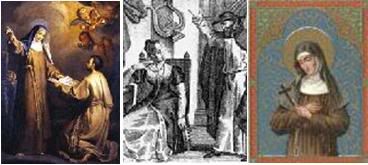 ST. GIACINTA (Hyacinth) MARISCOTTI (Italy, 1585-1640)
ST. GIACINTA (Hyacinth) MARISCOTTI (Italy, 1585-1640)
Virgin, Third Order Franciscan, Founder, Oblates of Mary
Daughter of a noble family in Viterbo, Clarice Mariscotti decided to join the Franciscan
Third Order for laywomen, taking the name Giacinta, after a nobleman she hoped to
marry chose her sister instead. However, she spent the next 15 years living confortably
amid colleagues who strictly observed the Franciscan rule. During a severe illness,
her confessor counselled her to change her ways, and she did - divesting herself of
every comfort and thereafter living penitentially, doing humble work in the convent.
She later established confraternities devoted to helping the poor, the aged and
prisoners, and to promote Eucharistic adoration. She became so renowned for her
holiness that when she died, people who came to venerate her took away pieces of
her clothing so that her garments had to be replaced three times while she lay in
state. She is buried in the Poor Clares convent in Viterbo and was canonized in 1807.
Readings for today's Mass: www.usccb.org/nab/readings/013010.shtml
OR today.
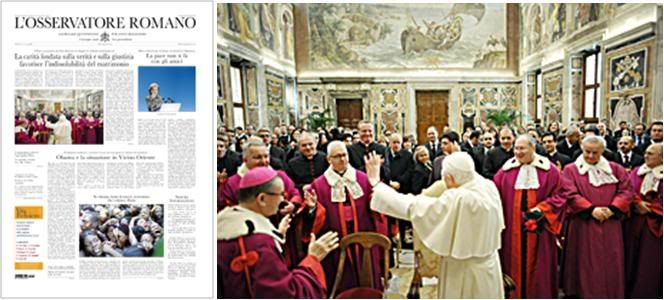
The Pope urges the Rota Romana to avoid pseudo-pastoral considerations in annulling marriages:
'Charity based on truth and justice must favor the indissolubility of matrimony'
Other Page 1 stories: US seeks to open dialog with Taliban in Afghanistan; Obama seeks to re-start Israeli-Palestinian peace
talks which have been stalled more than a year; in Haiti, hunger is the new catastrophe afflicting the earthquake victims due
to the unresolved logistical logjam in distributing aid. In the inside pages, a new survey shows more than 60% of Italians favor
keeping the Crucifix in schools; an obituary on the American writer J.D. Salinger; and a favorable review by historian Paolo Mieli
(also editor of Corriere della Sera), a Jew, of the monograph Rome and Jerusalem by Martin Goodman on the encounter
between the Jewish and Roman civilizations in the ancient world.
THE POPE'S DAY
The Holy Father met this morning with
- Cardinal George Pell*, Archbishop of Sydney
- Bishops of England and Wales (Group 3) on ad limina visit
- Mons. Petar Rajič, newly-named Apostolic Nuncio to Kuwait, Bahrein and Qatar, and Apostolic Delegate
to the Arabian Peninsula, with his family
and this afternoon with
- Cardinal Giovanni Battista Re. Prefect of the Congregation for Bishops (weekly meeting)
* Andrea Tornielli blogged today, after the Pope's schedule was released, to reiterate previous speculation that
Cardinal Pell is considered the leading candidate to succeed Cardinal Re shortly as Prefect of the Congregation
for Bishops.
POPE-POURRI
A Scottish newspaper reports that singing sensation Susan Boyle says she would like to sing
for the Pope if there is an opportunity when he visits Scotland later this year. She is a devout
Catholic who has attended a church in West Lothian, Scotland, all her life.
****
The Italian newspapers today predictably played up the Pope's message to the Roman Rota
yesterday to be more judicious about granting marriage annulments out of 'pseudo-pastoral'
concerns such as remarried Catholic divorcees wishing to be allowed Confession and
Communion again.
[Modificato da TERESA BENEDETTA 30/01/2010 18:02] |
| |
|
| |
 30/01/2010 14:25 30/01/2010 14:25 |
|
| | | OFFLINE | | Post: 19.377
Post: 2.019 | Registrato il: 28/08/2005
Registrato il: 20/01/2009 | Administratore | Utente Veteran | |
|
 Here's an excellent essay on the importance of papal authority for the moral leadership that the Catholic Church has in the world, and the ways in which the recent Popes have reinforced and promoted their moral authority and thereby the Magisterium of the Church - and how all this applies to the American situation.
The Papal Difference
Here's an excellent essay on the importance of papal authority for the moral leadership that the Catholic Church has in the world, and the ways in which the recent Popes have reinforced and promoted their moral authority and thereby the Magisterium of the Church - and how all this applies to the American situation.
The Papal Difference
by Joseph Bottum

Issue for February 2010
It was Norman Mailer, I think, who once quipped that most contemporary social criticism is the desperate attempt to find something to say about America that Alexis de Tocqueville hadn’t already said. It can get a little tiresome, the constant Tocquevillian citation in every writer’s effort to speak about the American experience.
[De Tocqueville's] Democracy in America sometimes seems the nation’s equivalent of the Sibylline Scrolls — a text to go dowsing in, with closed eyes and a pin, in the hope that something portentous and prophetic will emerge.
Nothing more sibylline — nothing more oracular and scrying — appears in Tocqueville than his oft-cited 1830 prediction that “our descendants will tend more and more to be divided into only two parts, those leaving Christianity entirely and others entering into the bosom of the Roman Church.”
Not that he was alone in such nineteenth-century visions. “Rome and the atheists have gained,” Herman Melville added in 1876. “These two shall fight it out — these two; Protestantism being retained for base of operations by Atheism.”
The current condition of the United States hardly bears out the prediction. The Protestant Mainline may have grown more than a little shaky as the stable guarantor of the American experiment.
But the nation remains a deeply religious one in its messy way, with evangelical Bible churches scattered out across the prairie, and Pentecostal storefronts filling the inner city, and a rising tide of Jews turning to Modern Orthodoxy, and Mormons in their temples, and even Muslims in their mosques.
Of course, there is no real unity among them: a surprising lack of antagonism, perhaps, but nothing that one could point to as the kind of grand ecumenical agreement symbolized, once upon an American time, by President Eisenhower’s flying up to New York to lay the cornerstone of the bravely new modern headquarters for the National Council of Churches — the home and the synecdoche of Mainline Protestant concord.
There does exist, however, the curious fact that all the contemporary religious look, in their own ways, to the Catholic Church for the institutional weight to anchor the public role of religion in America - through the Catholic schools, and the Catholic hospitals, and the Catholic bishops, and, most of all, the Catholic intellectual tradition.
The Church’s social teaching, while often misread through the familiar polarities of 1970s right and left, stands as the only comprehensive and politically significant religious vocabulary on public offer in America today — the only vocabulary that has much chance of transcending polarities and appealing across sectarian lines.
Even after the post–Vatican II decades of confusion, division, and cultural decay, the Catholic Church seems to retain enough cohesion to form the way American religion needs to speak.
For historians and social critics — for all of us plodding along the path that Tocqueville blazed — the question, of course, is why? And an answer may lie in that curious phrase Benedict XVI introduced as a rallying cry: the “dictatorship of relativism.”
The epistemological and moral relativism of secular liberalism is very American, in certain ways, but, on the level of national rhetoric, it undermines and constricts the American experiment in ordered liberty.
And where else besides Catholicism can we look for intellectual and even political support of the still-pervasive public conviction that we stand under a historically manifest source of moral authority beyond ourselves?
For a long while, Americans thought Catholicism was an un-American form of religion, but in our current situation, Catholicism alone appears able to synthesize faith and reason long enough, broadly enough, and deeply enough to avoid sectarianism. John Courtney Murray, the American Jesuit who influenced the Second Vatican Council’s decree on religious liberty, made essentially this argument, and the thirty years of debate over abortion has confirmed it. Catholic thought now defines the nonsecularist terms of American discourse — and does so, at its best, without threatening either the religious freedom or nonestablishment clauses of the First Amendment.
The Question of Authority
No one but a fool would say that Catholicism is certain to win the American public debate. Secularism may be out of gas, but it is still rolling forward, its inertial momentum carrying it onward.
We are surrounded by the ubiquitous, reflexive propaganda that dismisses as “sectarian” and “theocratic” any religious voice that clashes with the dominant secular view of any social issue.
For that matter, Catholic politicians have internalized the propaganda as much as anyone. Many of them used to say, for instance, that they had to support legal abortion despite their religious belief that abortion is immoral; yet to hear such figures as Nancy Pelosi and Joe Biden tell it, Catholic politicians must now support legal abortion precisely because their religion tells them it is immoral.
As my friend Paul Mankowski, S.J., once remarked, the Catholic Church’s moral agenda would be much advanced if every Catholic in Congress was replaced with a Mormon or a Muslim.
All this may be proof that the vaunted Catholic culture of the 1950s was not as healthy as pride and nostalgia have led many to believe. By the early 1970s, most of the educated Catholics who had come of age between World War II and Vatican II had thoroughly surrendered to the sexual revolution and, driven by that revolution’s inner logic, acceded to the legality of abortion.
Think of poor, lost Ted Kennedy as a clear example of what Chicago’s cardinal, Francis George, meant when he wrote: “The greatest failure of the post–Vatican II Church is the failure to call forth and to form a laity engaged in the world politically, economically, culturally, and socially on faith’s terms rather than the world’s.”
The bishops themselves have not recovered the moral authority that disappeared in the wake of the revelations, still ongoing, of the sex-abuse scandals of previous decades.
And, jurisdictional considerations aside, the bishops’ failure to adopt a coherent policy on the giving of the Eucharist to pro-abortion Catholic politicians has retarded that recovery, at least among the most faithful Catholic laity.
Taken one by one, such obstacles seem vincible, if only with the energy and courage that spring from an urgent sense of the need to unite around what’s rightly held in common. It helps that the Catholic Church is the largest single religious denomination in America, even if that is now due largely to Latino immigration.
Yet Catholic voting patterns aren’t much distinguishable, statistically, from those of the general population.
What makes the most difference is the kind of authority the Catholic Church strives, however fitfully, to exercise. There is a kind of power that can come only from speaking “with authority, not as the scribes,” even when the authority is not clearly recognized and acknowledged as such.
And this is what we might call “the papal difference.”
I do not mean simply the papacy’s unmatched ability to speak urbi et orbi. Nor do I mean even the First Vatican Council’s dogma of papal infallibility in matters of “faith and morals.” That dogma functions almost as a bogeyman and a warning to children among non-Catholics, more an obstacle than an anchor for Christian unity.
The papacy itself has invoked it only twice in the last century and a half—both times on questions of no political moment. The relevance of the dogma lies not so much in its sparing, formal application as in what it signifies about the Catholic Magisterium’s overall self-understanding.
Consider the topic that the Church’s critics seem to care most about: sexual morality. At its 1930 Lambeth Conference, the Anglican Church broke with the historic consensus of Christendom by allowing the use of contraceptives by married couples in “extreme cases.”
Pope Pius XI reacted fiercely and at once with the encyclical Casti Connubii, rejecting the Anglican decision while developing Catholic teaching on marriage to a greater extent than had any previous Pope.
In the years that followed, almost all Protestant denominations followed the Anglicans on contraception - and, unsurprisingly, many of those same Protestant denominations continued on to abandon all the other equally ancient teachings about sexual morality, marriage, divorce, and procreation.
Yet in 1968, against much pressure even from intramural dissent, Pope Paul VI reaffirmed Catholic teaching on contraception and abortion with Humanae Vitae. Since then, only the Catholic Magisterium has continued to uphold every one of the ancient Christian prohibitions.
Even more important, it has continued to develop the positive vision that explains the prohibitions. That vision is focused by John Paul II’s “theology of the body,” presented in a series of catechetical audiences from 1979 through 1983.
Though vulgarized by some of its popularizers today, the theology of the body was the first serious attempt, at the highest level of the Catholic Church, to provide a spiritually energizing account of what sexuality is for.
Benedict XVI has contributed distinctively with the first part of his encyclical Deus Caritas Est, and on the life-and-death questions of bioethics he has been vigilant and voluble since he arrived in Rome to help John Paul II.
Of course, the needed sort of theistic morality cannot regain political force in America if it appears as moralism - Catholic or otherwise. As Benedict has often pointed out, the morality must be, and be seen as, motivated by love and beauty: exemplified by witnesses who rejoice in the Lord, not just by teachers who rejoice in being right.
Central as it is to his projects, Benedict’s reasoned defense of reason will not persuade those who acknowledge neither the basis nor the scope of reason. For reason alone has never been enough to motivate reliably the embodied soul and ensouled body that is a human being.
Religion would be necessary for morality even had we not fallen with original sin. And in an era when even reason must find credentials outside itself, holistic evangelization is more necessary than ever.
Which bring us to the papal difference of authority. Not just geopolitical authority, though that is sometimes quite important, as, for instance, when John Paul II exercised it against communism; not even intellectual authority, indispensable as that has proved for Benedict’s papacy.
The papacy’s possession of those kinds of authority has waxed and waned over the centuries: occasionally falling to the point of risibility, and never rising to the point of irresistibility. Behind them, however, lies a kind of authority that makes the papacy unique: its claim, at least, to divinely granted and protected authority, charismatically institutional, over the Body of Christ on earth.
Benedict knows that, of course - which is why, even during the 1990s, as Cardinal Ratzinger, he nurtured doctrinal developments whose significance few Catholics, and even fewer non-Catholics, have noticed.
Most of these developments are about authority, especially the authority of the Magisterium exercised by the college of bishops, of which the Pope is head.
Consider just one fairly recent doctrinal development raising the question: Benedict’s endorsement of the International Theological Commission’s 2007 downgrading of limbo from the status of de facto doctrine to that of mere opinion.
The Catechism of the Catholic Church had already addressed the issue, albeit rather obliquely; for many of those who care about such things, however, the Pope’s endorsement of the commission’s white paper elicited plaints of confusion: How can a doctrine that almost all Catholics had believed since the Middle Age - and most thought they were bound to believ - be tossed aside as a needless “hypothesis” (in the Pope’s word)? Indeed, what does that say about the authority of the Magisterium?
Benedict explained why limbo is unnecessary either for Catholics to believe in or for its putative beneficiaries to enjoy. But the explanation mollified neither the traditionalists, still wedded to medieval propositions, nor the progressives, who wanted to know why other, still older propositions about sexuality could not also be jettisoned.
The limbo controversy replayed, in a minor key, the questioning and confusion that followed Vatican II’s apparent reversals on such things as religious liberty, ecumenism, and the idea of a vernacular liturgy — all of which had, in their turn, reminded scholars of earlier changes on such points as usury.
Many conservative Protestants in America, concerned about what seems to them Catholic wobbliness and woolliness, have echoed such concerns.
We could explain the papal difference by appealing to the intellectually and historically steadying influence of the papacy - but it would be ridiculous if no cogent reason beyond historical accident could be given, particularly for Americans, in our culture where the change that does occur is usually taken to be the change that ought to occur.
Any conservative appeal to religious authority must first show that the authority in question distinguishes consistently between permissible and impermissible change.
Before he became Pope Benedict, Joseph Cardinal Ratzinger was the intellectual figure in Catholicism most concerned with this point. We could speak here of women’s ordination and other loudly noticed issues. But it’s not hard to see what, in intra-Catholic terms, is really at stake.
If the progressives are right, then any doctrine that has not been “solemnly defined,” in the technical sense of that phrase, is legitimately revocable. That holds even for important doctrines peaceably held and taught for as far back as we have records - for instance, that contraception is intrinsically wrong.
To treat such an ancient doctrine as revocable leaves open the possibility of bringing Church teaching into line with popular American progressive views today - which is almost certainly why so many theologians hope for such theological developments.
Indeed, they hope that “development of doctrine” will give them all the issues they want. But it is just such possibilities that the work of John Paul II and Benedict XVI seems designed to rule out.
Consider the events of 1998, when John Paul II promulgated the Apostolic Constitution Ad Tuendam Fidem, accompanied by Ratzinger’s Doctrinal Commentary. Aimed at setting forth, as a matter of canon law, an oath of fidelity from Catholic theologians and clergy, Ad Tuendam Fidem specified two categories of doctrine calling for “definitive” assent from believers.
Pertinent here is the second: “each and everything definitively proposed by the Church regarding teaching on faith and morals.”
In his accompanying commentary, Ratzinger remarks:
Such doctrines can be defined solemnly by the Roman pontiff when he speaks “ex cathedra” or by the college of bishops gathered in council, or they can be taught infallibly by the ordinary and universal Magisterium of the Church as a “sententia definitive tenenda” [belief to be held definitively].
Every believer, therefore, is required to give firm and definitive assent to these truths, based on faith in the Holy Spirit’s assistance to the Church’s Magisterium and on the Catholic doctrine of the infallibility of the Magisterium in these matters.
Whoever denies these truths would be in the position of rejecting a truth of Catholic doctrine and would therefore no longer be in full communion with the Catholic Church.
The subsequent explanation notes that the teaching on women’s ordination falls into that category. But so does the doctrine of the “illicitness of euthanasia,” which John Paul II’s 1995 encyclical Evangelium Vitae had characterized as “based upon the natural law and the written Word of God, transmitted by the Church’s Tradition, and taught by the ordinary and universal Magisterium.”
Other examples Ratzinger gives are the traditional condemnations of fornication and prostitution.
They are, however, only examples. The days are long past, if they ever existed, when Vatican documents could quell all dissent. But so also are the heady, post–Vatican II days when everything seemed up for grabs.
The issue of what constitutes authority is, in some ways, an arcane intra-Catholic meta-magisterial issue. But it is not the sort of thing Rome ever unsays, especially now that the word infallible has been used. In that sense, it remains true that Roma locuta, causa finita(Rome speaks, case closed).
And, over time, this should suffice to quell doubts, among religious conservatives of various bodies, that what’s unique about papal authority is eroding. Much to progressive chagrin, it is objectively strengthening.
More than geopolitics, and as much as reason itself, that is what’s needed to check the dictatorship of relativism. It’s the papal difference that, in the longest term, makes the most difference.
In the American context, however, doctrinal authority, even combined with geopolitical and intellectual authority, still isn’t enough. For one thing, it doesn’t restore de facto moral authority to a Catholic hierarchy tarnished by the sex-abuse scandals.
That is a major reason Benedict’s 2008 trip to the United States was so important. His well-publicized statements of sorrow about the sex-abuse scandals, and his unprecedented pastoral meeting with victims, at least assured Americans that he cares enough about the “filth” that he had identified in his conclave homily to the assembled cardinals in 2005.
Combined with the American hierarchy’s draconian new vetting and reporting procedures, and the massive monetary payouts that continue, that is enough at least to begin the road to recovery.
Of course, Benedict did much else on that trip.
His White House address expressed the congruence of the American experiment with the Church’s developed conception of human rights:
From the dawn of the Republic, America’s quest for freedom has been guided by the conviction that the principles governing political and social life are intimately linked to a moral order based on the dominion of God the Creator. The framers of this nation’s founding documents drew upon this conviction when they proclaimed the self-evident truth that all men are created equal and endowed with inalienable rights grounded in the laws of nature and of nature’s God.
And in that speech, Benedict went on to express the hope that the Catholic Church would make a distinctive contribution to the American experiment.
That, in turn, is why his address to Catholic educators at the Catholic University of America combined his characteristic emphasis on the synthesis of faith and reason with an equally needed reminder that its faithful transmission to the young is a sine qua non of maintaining Catholic identity.
Catholicism can make no distinctive contribution to the culture without agreement among its educated elite about what makes Catholic education distinctive and about why that element should continue defining its major semi-secular institutions: not only schools of all levels but charities and health-care institutions as well.
The vast array of such institutions founded years ago by the Protestant Mainline have long since been secularized. That has not yet entirely happened with the majority of Catholic institutions, which nonetheless struggle in a peculiarly American way to maintain their religious identity.
The papal difference is needed for these limicole institutions to maintain an identit - and the papal difference is also needed if those institutions are going to matter to American public life.
The papal difference is needed, in other words, if these institutions are going to aid the odd, in-but-not-of-the-world role that America needs religion to play.
Over the next decade, the most visible battlegrounds of American religion are going to be the Catholic colleges and hospitals. The battle over President Obama’s visit to Notre Dame last spring was only the beginning. And this shouldn’t surprise us.
The Catholic institutions are places where religion obviously impinges on public life in this nation — and public life impinges on religion.
Which is all rather the point. We need, to maintain the American experiment, the support and the criticism that religion alone can express. And, as Tocqueville predicted, Catholicism provides the only viable vocabulary in which that support and that criticism can still be cogently and publicly expressed.
[Modificato da TERESA BENEDETTA 30/01/2010 14:27] |
| |
 30/01/2010 18:26 30/01/2010 18:26 |
|
| | | OFFLINE | | Post: 19.379
Post: 2.021 | Registrato il: 28/08/2005
Registrato il: 20/01/2009 | Administratore | Utente Veteran | |
|
 In his weekly column, John Allen discusses the 30 GIORNI issue that contains several articles on the Church in China, as previewed by Andrea Tornielli in an article that I translated and posted in the CHURCH&VATICAN thread yesterday.
In his weekly column, John Allen discusses the 30 GIORNI issue that contains several articles on the Church in China, as previewed by Andrea Tornielli in an article that I translated and posted in the CHURCH&VATICAN thread yesterday.
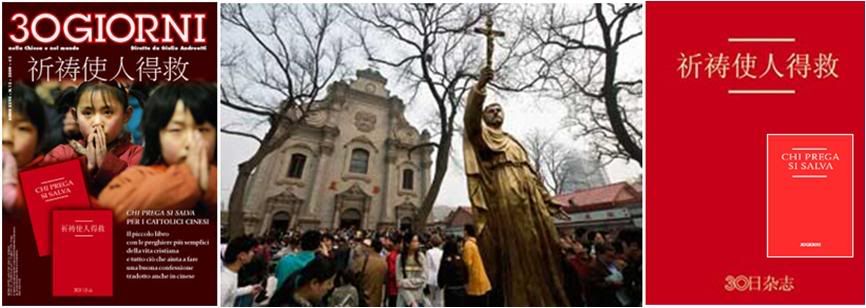 Center, parishioners after Sunday Mass in Beijing's cathedral. Right photo, a Chinese edition of a 30 GIORNI book of prayers [He who prays, saves himself], originally published in Italian with an introduction by Cardinal Joseph Ratzinger, and which has now been translated to Chinese.
By focusing on the Pope, Allen provides the occasion to introduce the subject in this thread. He also adds a summary of the views expressed by a Beijing officail on the government's changed attitude towards the Church - an element not included in Tornielli's article... And as usual, I am not too keen on Allen's insistence on inappropriate colloquialisms like 'spin the Pope'.
Playing 'spin the Pope' in China
Center, parishioners after Sunday Mass in Beijing's cathedral. Right photo, a Chinese edition of a 30 GIORNI book of prayers [He who prays, saves himself], originally published in Italian with an introduction by Cardinal Joseph Ratzinger, and which has now been translated to Chinese.
By focusing on the Pope, Allen provides the occasion to introduce the subject in this thread. He also adds a summary of the views expressed by a Beijing officail on the government's changed attitude towards the Church - an element not included in Tornielli's article... And as usual, I am not too keen on Allen's insistence on inappropriate colloquialisms like 'spin the Pope'.
Playing 'spin the Pope' in China

January 29, 2010
All over the world, children play some version of the game “spin the bottle.” In the Catholic church, there’s an analogous indoor sport we might call “spin the Pope.” The rules are that when a papal edict appears, the players are stuck with the language of that decree, and have to find some way to make it say what they want it to say.
In the West, a classic example came with the Vatican’s 2005 document barring the admission of homosexuals to seminaries. Did that mean any candidate with a same-sex orientation is ineligible, or only someone who’s part of the so-called “gay lifestyle”? In seminaries and religious orders, the document has been interpreted both ways, resulting in a wide diversity in actual practice.
Westerners aren’t the only ones who know how to play the game, however, as a recent package on China in the indispensable Italian Catholic magazine 30 Giorni illustrates.
The occasion for the package was publication of a Chinese-language edition of a small collection of traditional Catholic prayers called Who Prays is Saved, along with a brief introduction by Bishop Aloysius Jin Luxian of Shanghai. [Allen missed the point. The Chinese edition of the prayer book was an initiative to accompany the 30 GIORNI special report, which was itself occasioned by a trip to Tibet last autumn of publisher editor Giulio Andreotti, which gave his staff a chance to gather the material they publish in the December 2009 issue of the magazine.]
To accompany it, Gianni Valente of 30 Giorni authored a profile of Bishop Francis An Shuxin of Baoding, and the magazine also presented an interview with Ren Yanli, a member of the Chinese Academy of Social Sciences and the Research Institute for World Religions (a scholarly body sponsored by the Chinese government).
What emerges is a portrait of a church divided. The core issue is how the Church ought to relate to the Chinese government, and the battleground is formed by competing interpretations of Pope Benedict XVI's June 2007 letter to Chinese Catholics.
Valente presents Bishop An, 60, as a misunderstood hero, a bishop loyal to Rome who spent ten years in prison for his fidelity, and who has now chosen to come out into the open and cooperate with government officials because that seemed the face-value reading of the Pope’s instructions from two years ago.
“Clandestinity does not come within the normal life of the Church,” Benedict wrote at the time, saying there’s nothing wrong with cooperating with state officials and religious bodies as long as “essential principles of faith and ecclesiastical communion” aren’t compromised.
An says that when he was released from prison in 2006, he initially refused to join the Patriotic Association, the official government body that oversees Catholic affairs in China, and whose very existence is considered an affront by many Catholics. After the Pope's letter, An said, he changed his mind.
For that decision, Valente reports, An has been vilified among hard-liners in the Chinese Catholic community and their supporters in the West, including a cross-section of news agencies and blogs.
In China, Valente writes, some laity and clergy have refused to accept An’s authority, considering him illegitimate, despite the fact that Cardinal Ivan Dias of the Congregation for the Evangelization of Peoples released a letter in June 2008 stating that An “has the total support and confidence of the Holy See.”
Valente contrasts An with the 78-year-old emeritus archbishop of Hong Kong, Cardinal Joseph Zen, who’s more reluctant to go along with the state. Last November, Zen published a 22-page guide to interpretating Benedict’s letter, the overall thrust of which is to buttress his hard-line position. (Valente calls Zen’s effort to set himself up as the arbiter of what the Pope meant “out of the ordinary and self-inspired.”)
Valente also quotes An as saying that some Chinese priests still haven't presented the Pope's letter to local Catholics, in some cases suggesting that Benedict was "confused" or got bad advice.
At stake is which vision of the future Chinese Catholics ought to embrace: Continuing defiance until the one-party Communist system collapses under its own weight, as in Eastern Europe; or gradual normalization, accepting that the state is not going to disappear, and thus working to reform existing institutions to make them more congenial to the Church.
The thrust of Valente’s piece is to suggest that the latter is clearly the understanding of the Vatican and of Benedict XVI. He notes, for example, that in November Cardinal Tarcisio Bertone, the Secretary of State, addressed a letter to Chinese priests indicating “reconciliation within the Catholic community and respectful and constructive dialogue with the civil authorities” as the guidelines of the Pope’s 2007 letter.
In that regard, Valente appears to suggest that while thorns in the side of the Communists such as Zen may get adoring press in the West, moderates such as An are the ones actually pointing the way to the future.
That’s hardly the only way of sizing things up, of course – but it is striking that this is the diagnosis of perhaps the most influential Catholic publication in Italy, and one often close to the thinking of senior Vatican officials.
If normalization is to occur, it presupposes that both sides in the church/state relationship are willing to give. In that regard, the interview with Ren Yanli is particularly interesting, because he suggests that government policy vis-à-vis Catholicism is shifting.
De facto, Yanli argues, the Chinese government has abandoned the original Communist vision of a completely autonomous church cut off from Rome, in favor of a distinction between matters of faith and ecclesiastical discipline (where they’re willing to concede that the pope is in charge) and questions of politics (where bishops and clergy are essentially expected to mind their own business).
What explains the change? According to Yanli, it’s the faith of local Catholics. In effect, the compact refusal of Chinese Catholics to accept leaders perceived as illegitimate has forced the government’s hand.
“The idea of imposing independence on the Church that separates it from Rome and the Universal Church has been set aside in fact,” Yanli said. “The decisive factor was the faith itself of Chinese Catholics, both laity and clergy.”
Coming from a scholar who’s effectively on the government payroll, that has the smack of an important concession.
“Many new bishops at the beginning and end of their consecration wanted to show in public the letter of appointment received from the Pope, not least because they knew that the faithful would never heed pastors elected and consecrated autonomously, without the consent of the Pope,” he said. “The last bishops appointed without papal mandate were isolated and no one wanted to take the Eucharist from their hands during Mass.”
As a result, Yanli says, “if in the past someone might have been tempted to make a career in an independent Church, the faith of the people helped everyone to make the design ineffectual. And that also helped the government to redirect its policy.”
Yanli predicts that the broad trajectory is toward normalization, but warns that steps percieved as aggressive or unilateral can revive old tensions.
For example, he notes that every Catholic bishop appointed in China in 2005 had the prior consent of the Pope, but when Zen was made a cardinal in 2006, the government returned to naming bishops without papal mandate.
The key for today’s more pragmatic brand of Chinese leader, Yanli argues, is carving out a “religion policy” that understands autonomy in political terms rather than in the spiritual and ecclesiastical realm.
He said the government has hinted that it’s willing to revise the statutes of state-sponsored religious bodies along these lines, but “without blatant shifts” that might be perceived as destabilizing.
And while we're at it, here's the 'supplement' I added to Tornielli's report yesterday in the CHURCH&VATICAN post:
THE PRAYER BOOK
Cardinal Joseph Ratzinger wrote the Introduction for the prayer book
published by 30 GIORNI in 2005 just three months before he was elected Pope.

Here is a translation of the Introduction:
Since man was man, he has prayed. Always and everywhere, man has realized that he is not alone in the world, that there is someone who listens. He has always realized that he needs Another much greater than he, to whom he should address himself so that his life may be what it ought to be.
But the face of God had always been hidden, and only Jesus has shown us his true face, Whoever sees Him sees the Father (cfr Jn 14,9). Therefore, if on the one hand, praying comes naturally to man (to ask in times of need and to thank in times of joy), on the other hand, there is also man’s inability to pray and to speak with a hidden God. We do not know what we should ask, St. Paul writes (cfr Rm 8,26).
And so, we should always ask the Lord, as the disciples did: “Lord, teach us to pray!” (Lk 11,1). The Lord has taught us the ‘Our Father’ as a model for authentic prayer, and has given us a Mother, the Church, who helps us to pray.
The Church has received from Sacred Scripture a great treasury of prayers. In the course of centuries, there have also emerged, from the hearts of the faithful, numerous prayers with which, ever anew, they address themselves to God. In praying with Mother Church, we ourselves learn to pray.
I am therefore very happy that 30 GIORNI is publishing a new edition of this little book containing the fundamental prayers of Christians, as these have taken form through the centuries. May they be with us in all the events of our life and help us to celebrate the liturgy of the Church in prayer.
I hope that this little book can be a traveler’s companion to many Christians.
Rome, February 18, 2005
JOSEPH CARDINAL RATZINGER
[Modificato da TERESA BENEDETTA 30/01/2010 18:31] |
| |
 30/01/2010 21:50 30/01/2010 21:50 |
|
| | | OFFLINE | | Post: 19.381
Post: 2.023 | Registrato il: 28/08/2005
Registrato il: 20/01/2009 | Administratore | Utente Veteran | |
|

 From left: PATH, the academy's magazine; PATH banner illustrated by a detail from 'Thomas's Doubt', Caravaggio; and PATH'S theological journal.
International theology conference
From left: PATH, the academy's magazine; PATH banner illustrated by a detail from 'Thomas's Doubt', Caravaggio; and PATH'S theological journal.
International theology conference
has a Christocentric theme
By Anita S. Bourdin

ROME, JAN. 29, 2010 (Zenit.org).- In 2002, Pope John Paul II told the Pontifical Academy of Theology that its first duty is to meditate on Christ, fullness of truth.
At its fifth international conference, under way through Saturday in Rome, the academy continues to fulfill this exhortation.
The three day conference is on "The Light of Christ: Between Mystery, Experience and Perspectives in the Way of Light of the Church."
The theme follows the line of John Paul II's encyclical "Redemptor Hominis," explained Father Francois Marie Lethel, secretary of the academy, when he presented the forum last Tuesday, with Archbishop Gianfranco Ravasi, president of the Pontifical Council for Culture.
Father Lethel noted how the forum is organized every two years and that the Christocentric aspect of its work is inspired in a pointer John Paul II gave during an audience in 2002.
"The priority task of the Pontifical Academy of Theology is meditation on the mystery of Jesus Christ, our Master and Lord, fullness of grace and truth (cf. John 1:16). From this source of light originates the mandate of preaching, of witness and of involvement in dialogue, both ecumenical and inter-religious," the Pope told them.
Father Lethel stressed the academy's commitment to this line of theological reflection, taking into account "the experience of the saints" and "the experience of the People of God."
Father Lethel himself is known for his French-language thesis on the theology of the saints. He told ZENIT that in this work, he highlights "the heroic virtues of John Paul II," which were confirmed by Benedict XVI last Dec 19.
"John Paul II is not only a great Pope and a great thinker, but the holiness of his life is guaranteed, and his teachings will have to be re-interpreted as those of a saint," Father Lethel observed. [Why should it make any difference? Those teachings are valid, regardless, and that the Pope who taught them becomes a canonized saint will not make them mean something else; it simply reinforces what we believe about his holiness.]
Another aspect that Father Lethel develops is the importance of Benedict XVI's catecheses in the Wednesday general audience.
"After the fathers of the Church, the Pope considered the saints of the Middle Ages. He mentioned Thérèse of the Child Jesus when speaking to theologians on Dec. 1, 2009, and again on Dec. 2, in his catechesis to the People of God, in line with a great author of the Middle Ages, William of Saint-Thierry," the priest recalled.
He added that the theology of the saints is that of Thomas Aquinas, of Francis of Assisi, of Thérèse of Lisieux, of persons who have a very great education and of others with more limited education, but who are the "knowers of God" precisely because they love with all their heart.
"He who loves is born of God and knows God; he who does not love, has not known God because God is Love," the theologian affirmed.
The first day of the conference included an audience with Benedict XVI.
Working sessions have focused on "The Subject of Light in Sapiential Biblical Theology" and "The Christ Light Who Illumines Theological Thought."
Today, the theologians addressed the questions of "Light of Christ, the Experience of Light in Christian Life" and "Theology in Dialogue With the Thought and Culture of our Time."
NB: The Pontifical Theological Academy is one of the Curial institutions that has a decent and fairly informative sub-site on the Vatican main site. It also carries articles from its magazine and journal.
www.vatican.va/roman_curia/pontifical_academies/theologica/inde...
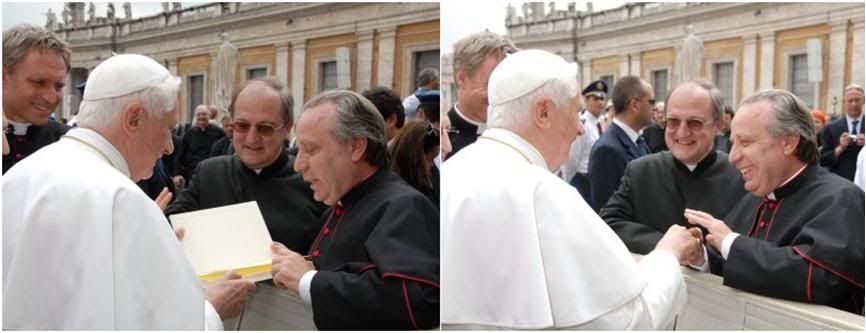 Academy members Mons. Piero Codo and Fr. Enrico Dal Covolo (right), SDB, present Benedict XVI with a special issue of the Academy's PATH magazine on his 80th birthday in 2007. Fr. Dal Covolo was recently named by the Pope to preach the spiritual exercises for the Holy Father and the Roman Curia at the start of Lent this year.
Academy members Mons. Piero Codo and Fr. Enrico Dal Covolo (right), SDB, present Benedict XVI with a special issue of the Academy's PATH magazine on his 80th birthday in 2007. Fr. Dal Covolo was recently named by the Pope to preach the spiritual exercises for the Holy Father and the Roman Curia at the start of Lent this year.
|
| |
 30/01/2010 22:29 30/01/2010 22:29 |
|
| | | OFFLINE | | Post: 19.382
Post: 2.023 | Registrato il: 28/08/2005
Registrato il: 20/01/2009 | Administratore | Utente Veteran | |
|


 A rather belated report, considering that the event reported took place last November, but Thompson appears to have the excluive on it, as it has not been reported elsewhere.
'Unhappy' Queen sends Lord Chamberlain
A rather belated report, considering that the event reported took place last November, but Thompson appears to have the excluive on it, as it has not been reported elsewhere.
'Unhappy' Queen sends Lord Chamberlain
to ask Archbishop Nichols
about Pope's Anglican plan

January 29, 2010
In a surprising departure from protocol, the Queen sent the Lord Chamberlain, the most senior official of the Royal Household, to see Archbishop Vincent Nichols, leader of the Roman Catholic Church in England and Wales, to discuss Pope Benedict XVI’s offer to Anglicans wanting to convert to Rome en masse.
My source says Her Majesty – who is expected to meet the Pope when he visits Britain this autumn – was “unhappy” about aspects of the scheme as she understood it.
So, late last year, she dispatched Lord Peel with a list of questions for the Archbishop. The nature of the questions has not been revealed, but Archbishop’s House confirms that the meeting took place and was “mutually beneficial”.
 Left, The Queen with John Paul II in 2001; center, the Queen is considered the Supreme Governor of the Church of England and the Church of Scotland - one of her titles is 'Defender of the Faith'; right, Benedict XVI with the Archbishop of Canterbury.
Left, The Queen with John Paul II in 2001; center, the Queen is considered the Supreme Governor of the Church of England and the Church of Scotland - one of her titles is 'Defender of the Faith'; right, Benedict XVI with the Archbishop of Canterbury.
The Queen – a somewhat “Low Church” Anglican who feels it is her solemn duty to preserve the Protestant identity of the Church of England – appears to have been alarmed by press reports of Pope Benedict’s Apostolic Constitution Anglicanorum coetibus. This allows groups of ex-Anglicans anywhere to convert to Rome together, retaining aspects of Anglican worship.
Some members of the Church of England have expressed interest in doing so, but are very keen to carry on worshipping in their former Anglican parish churches. Possibly the Queen felt that this process might conflict with her Coronation Oath to maintain all the “rights and privileges” of the bishops, clergy and churches of England.
My source was surprised that the Queen should ask one of her courtiers, the Ampleforth-educated but Anglican 3rd Earl Peel, to quiz Archbishop Nichols on the subject.
The source felt that the meeting – thought to have been held in November at Archbishop’s House, Westminster – could be seen as a breach of protocol: one would expect the Archbishop of Canterbury, Dr Rowan Williams, to represent the Church’s Supreme Governor in such a discussion.
There have been rumours that the Queen is dismayed by the Anglican drift towards homosexual blessings and women bishops. Perhaps she felt that she needed an adviser answerable only to her to convey information impartially – particularly given that she will probably meet Pope Benedict in Scotland, either at Balmoral or Holyrood, when he visits Britain in September.
(The discussion between Lord Peel and the Archbishop is unlikely to have been about this meeting, however, since the Scottish Catholic Church is independent of England and Wales.)
At any rate, the spokesman for Archbishop Nichols insisted tonight that the meeting was a success. “It gave the Archbishop the opportunity to correct some of the misunderstandings about the Apostolic Constitution created by misreporting in the media,” he told me. “It was a very successful meeting and mutually beneficial.”
What the spokesman couldn’t tell me – and indeed, didn’t seem to know – was why the leader of the Catholic Church in England and Wales should have been asked to see the Lord Chamberlain, of all people, to discuss what is essentially a theological and constitutional question.
The Catholic Bishops of England and Wales have been asked by Rome to discuss a provisional structure for the ex-Anglican “Ordinariate” (a quasi-diocese). Archbishop Nichols is a key figure in this process, and I don’t envy him.
On the one hand, some of his bishops hate the Pope’s proposal and will work to make its provisions as ungenerous as possible; on the other, he has to report to the Congregation for the Doctrine of the Faith, which is ultimately in charge of the Ordinariate scheme on behalf of the Pope, and which does favour generosity.
Now, it would seem, the Archbishop has also to bear in mind the Queen’s early misgivings about a scheme which could see a few parish communities moving from the Church that she governs – and that she promised to protect at her Coronation – to the jurisdiction of the Holy See.
[Modificato da TERESA BENEDETTA 31/01/2010 00:54] |
| |
 31/01/2010 00:44 31/01/2010 00:44 |
|
| | | OFFLINE | | Post: 19.383
Post: 2.025 | Registrato il: 28/08/2005
Registrato il: 20/01/2009 | Administratore | Utente Veteran | |
|

 THE JOYOUS POPE
THE JOYOUS POPE
Beatrice on her site
 benoit-et-moi.fr/2010-I
benoit-et-moi.fr/2010-I
calls attention to the smiling pictures chosen to portray Benedict XVI
in the 2010 calendar put out by L'Osservatore Romano, and has scanned
some of them, shown below.
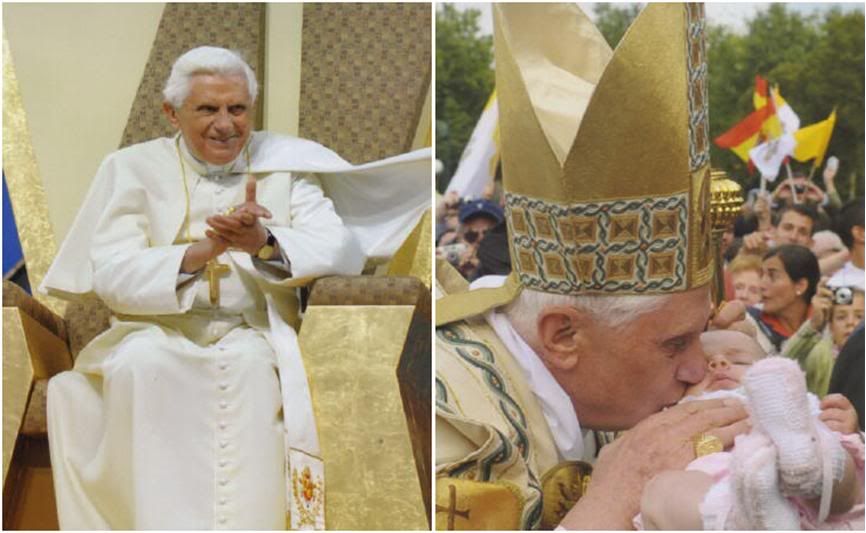
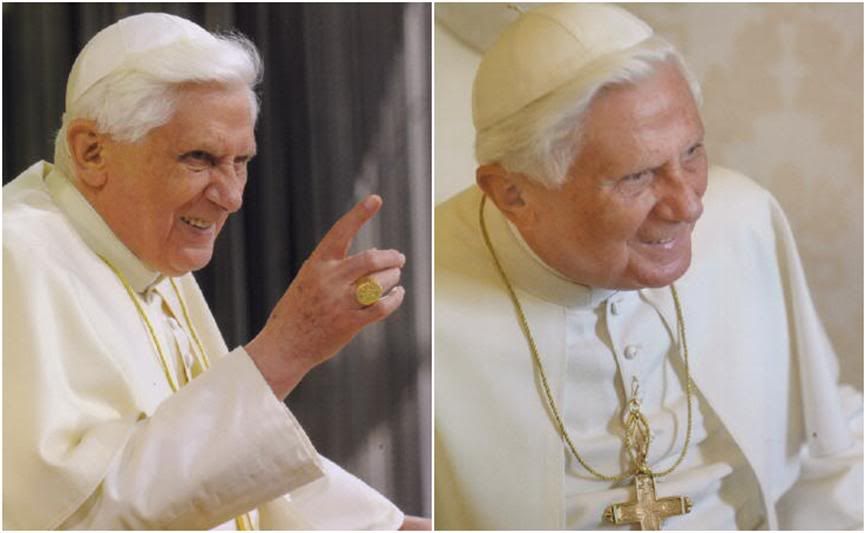 I am unable to post any of the pictures in larger size because they all come from thumbnails that can only be enlarged so much.
I am unable to post any of the pictures in larger size because they all come from thumbnails that can only be enlarged so much.
I do have two comments to make:
1. It's about time the photo editors who decide on what photographs to use for these calendars realized that they can't go wrong with choosing the smiling photos - Benedict XVI is so quick to smile, and his smile is delightful, the very expression of the inner joy that makes him glow externally.
2. How is it possible that of the dozens, if not hundreds, of photographs taken by the Vatican photographers at each papal event, they have not come up with less 'familiar' photos if one goes by the four above that Beatrice reproduced? [The fifth one is a photo of the Pope with Australian youth on the deck of the ship in Sydney for WYD).
Anyway, a happy enterprise and let us hope they get better next year and the years to come.
While I'm at it, let me add a couple of pictures that I picked up at random recently while Googling other things:
This one was in a news item about the death last month of the Dutch theologian Edward Schillebeeckx, who was one of the older - and more liberal - theologians at Vatican II, and went on to be disciplined by the CDF under Cardinal Ratzinger for his unorthodox teachings.
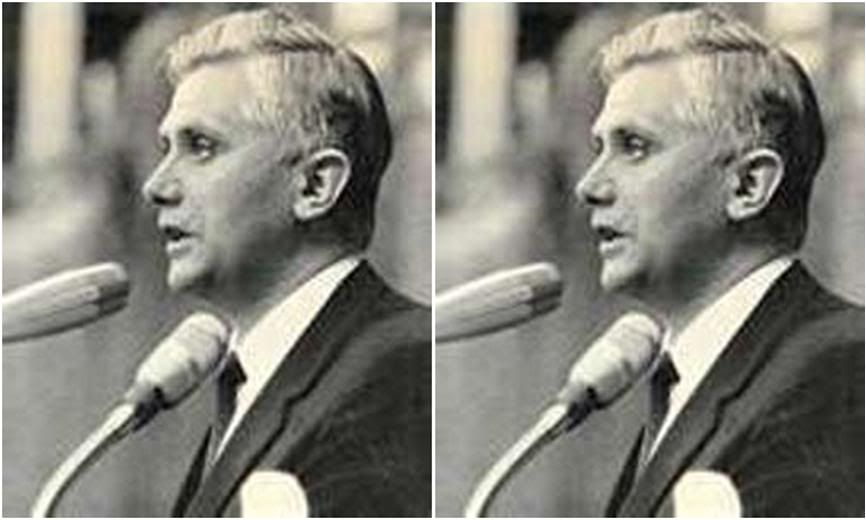 The photo is not dated but it was presumably some time during the Council or shortly afterward. I doubled it since I can't enlarge it more without losing sharpness.
The photo is not dated but it was presumably some time during the Council or shortly afterward. I doubled it since I can't enlarge it more without losing sharpness.
The following two photos were lifted from a RomeReports video clip of the Pope in Aosta and shows him in his study at Les Combes. I am not clear whether they date from his previous visits there, but if it was from 2009, then it was before he fractured his right wrist:
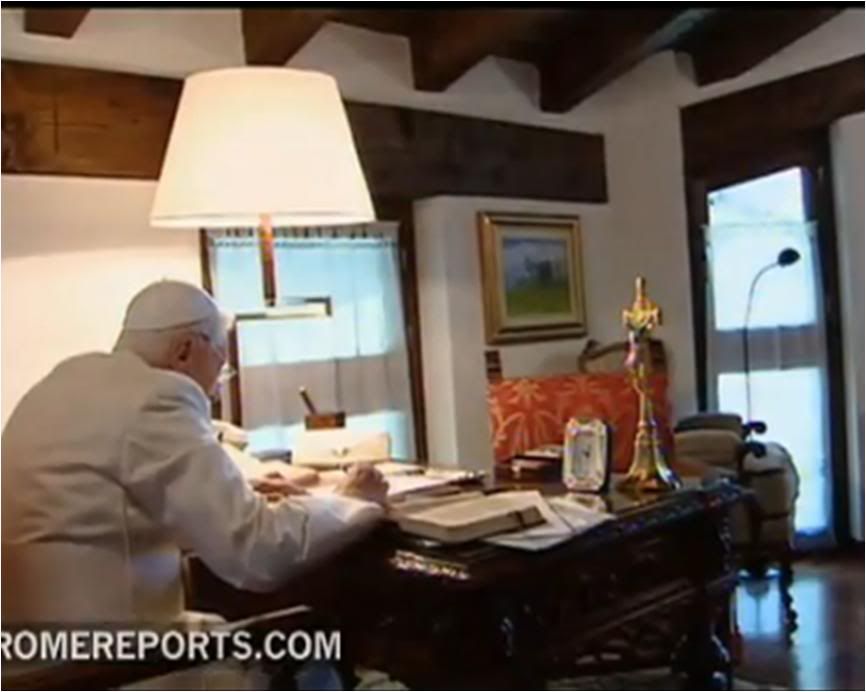
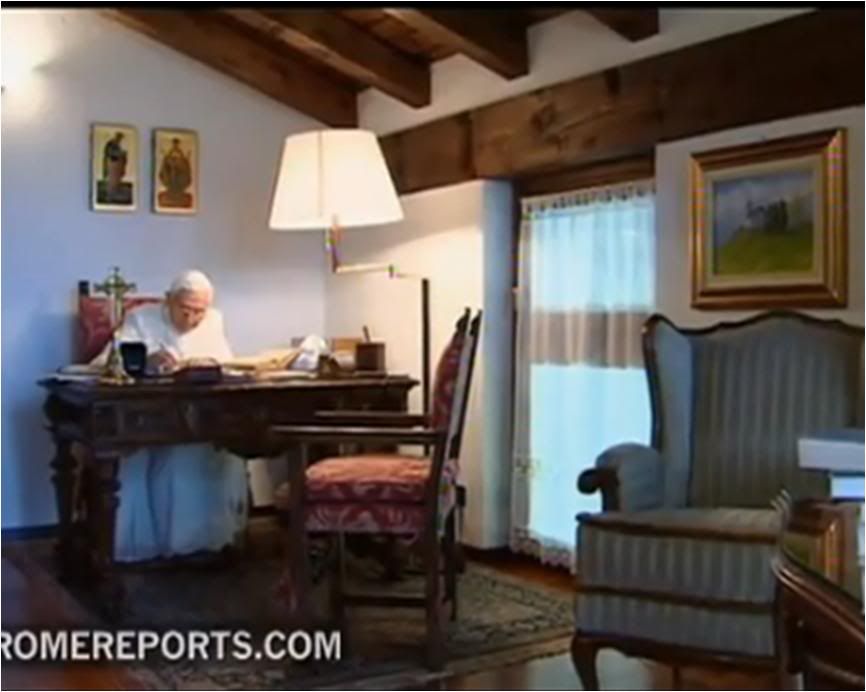
[Modificato da TERESA BENEDETTA 31/01/2010 06:35] |
| |
 31/01/2010 17:09 31/01/2010 17:09 |
|
| | | OFFLINE | | Post: 19.385
Post: 2.027 | Registrato il: 28/08/2005
Registrato il: 20/01/2009 | Administratore | Utente Veteran | |
|
 Sunday, January 31
Sunday, January 31
 ST. GIOVANNI (John) BOSCO, (Italy, 1850-1888) - Priest, Founder of the Society of St. Francis de Sales, 'Father and Teacher of Youth'
ST. GIOVANNI (John) BOSCO, (Italy, 1850-1888) - Priest, Founder of the Society of St. Francis de Sales, 'Father and Teacher of Youth'
Familiarly known around the world as Don Bosco, which is how he was best known in life ('Don' is the Italian honorific for a Catholic priest), his first assignment
as a priest was as chaplain of a girls' boarding school in Turin, when he first started tending to poor children on the side through an 'oratory' he named for St.
Francis de Sales and which did not find a fixed home until much later. His first co-worker was his mother, who became known to everyone as Mamma Margherita
[and who was declared Venerable in November 2006], who spent the last 10 years of her life helping him care for his wards. In 1846, they started taking in orphans.
Don Bosco's philosophy was to educate young boys with 'reason, religion and kindness', not forgetting music and sport, as well as practical vocational training -
all this continue to be the distinguishing marks of Salesian schools all over the world. By 1859, Don Bosco's work had attracted the attention of Pope Pius IX who
supported him when he decided to establish his Salesian order of priests and lay brothers, now better known as the Salesians of Don Bosco (SDB). Eventually,
an order of Salesian sisters was also established. In life, Don Bosco already had a reputation for holiness and working miracles. Shortly after his death, there was
a popular movement to make him a saint. But the hearings for his cause brought out all his adversaries in the Church hierarchy who thought he was a loose cannon
and wheeler-dealer. Pius XI, who had known him personally, pushed his cause in the 1920s, beatifying him in 1929 and canonizing him in 1934 with the title 'Father
and Teacher of Youth'. He is buried at the Basilica of Mary Help of Christians in Turin.
Readings for today's Mass: www.usccb.org/nab/readings/013110.shtml
OR today.
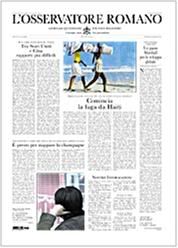
No papal stories in this issue. A front-page editorial by Ettore Gotti Tedeschi,
advocates a Marshall Plan effort to help developing countries solve the root
causes of mass migration. Other Page 1 stories: US rules out negotiating with
Taliban extremists; and 5.6% rise in the US GDP in the last quarter of 2009
is seen as artificial and not to be misread as the end to recession.
THE POPE'S DAY
Angelus today - The Holy Father spoke about the famous 'hymn to love' in St. Paul's First Letter to
the Corinthians from today's readings, stressing that love is the essence of Christianity, and paid
homage to St. John Bosco as a model in this Year for Priests. After prayers, he had several special
messages concerning the Day for Lepers today; the Day of Prayers interceding for peace in the Middle
East; joining the Italian bishops' appeal for job creation to help Italians hurt by the crisis; and
the annual Caravan for Peace of the youth arm of Italian Catholic Action, which ended with two children
helping the Pope to release symbolic doves of peace.
[Modificato da TERESA BENEDETTA 31/01/2010 17:16] |
| |
 31/01/2010 19:33 31/01/2010 19:33 |
|
| | | OFFLINE | | Post: 19.386
Post: 2.028 | Registrato il: 28/08/2005
Registrato il: 20/01/2009 | Administratore | Utente Veteran | |
|
 ANGELUS TODAY
ANGELUS TODAY
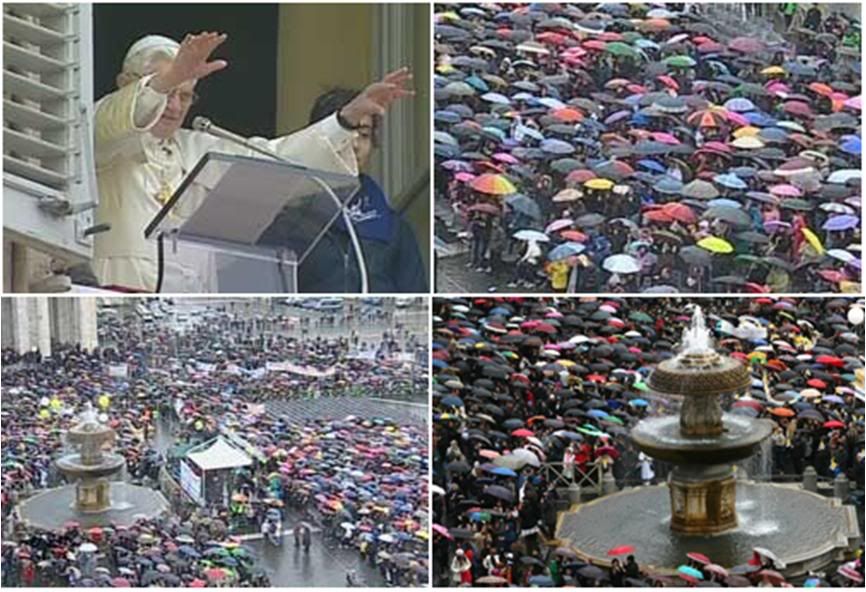
Before the Angelus prayers today, the Holy Father spoke about the famous 'hymn to love' in St. Paul's First Letter to the Corinthians from today's readings, stressing that love is the essence of Christianity, and paid homage to St. John Bosco as a model in this Year for Priests.
After prayers, he had several special messages concerning the Day for Lepers today; the Day of Prayers interceding for peace in the Middle East; joining the Italian bishops' appeal for job creation to help Italians hurt by the crisis; and the annual Caravan for Peace of the youth arm of Italian Catholic Action, which ended with two children
helping the Pope to release symbolic doves of peace.
In English, this is what he said:
In today’s Liturgy we are reminded that Jesus, like the prophets who came before him, was not well received in his homeland and among his relatives and friends.
His message brings great joy but also requires open minds and generous hearts. Let us ask for the grace and courage to be always faithful to Jesus in words and deeds.
I wish you all a pleasant stay in Rome and a blessed Sunday!
These were his special messages after the Angelus prayers:
The last Sunday in January is the World Day for Lepers. Our thoughts go spontaneously to Fr. Damiaan de Veuster who gave his life for these brothers and sisters and whom I proclaimed a saint last October.
I entrust to his celestial protection all the persons who still suffer today from this affliction, as well as the health care workers and volunteers who are giving themselves in order that there may be a world without leprosy. I particularly greet the Italian Association of the Friends of Raoul Follereau.
Today we also observe the second Day of Intercession for for Peace in the Holy Land. In communion with the Latin Patriarch of Jerusalem and the Custodian of the Holy Land, I spiritually join the prayers of so many Christians in every part of the world, as I greet all those who are gathered for this purpose.
The economic crisis is causing the loss of numerous jobs, and this situation calls for a great sense of responsibility on the part of everyone: entrepreneurs, laborers and government. I think of some difficult situations in Italy, as, for instance, Termini Imerese and Portovesme [two industrial cities hit by job losses due to the closure of Alcoa and Fiat factories, respectively].
Therefore, I join the appeal of the Italian bishops' conference who have urged that everything possible be done in order to protect and grow more jobs, assuring work that is dignified and adequate to support workers' families.
Today we are brought a message of peace by the boys and girls of the Catholic Action of Rome. Beside me are two of them whom I greet, along with all the others in St. Peter's Square who are accompanied by the Cardinal Vicar, their families and their teachers.
Dear children, I thank you because with your Caravan for Peace and the symbol of the doves which we will be releasing shortly, you are giving everyone a sign of hope. Now let us listen to the message that you prepared.
[One of the two children with the Pope reads the message.]
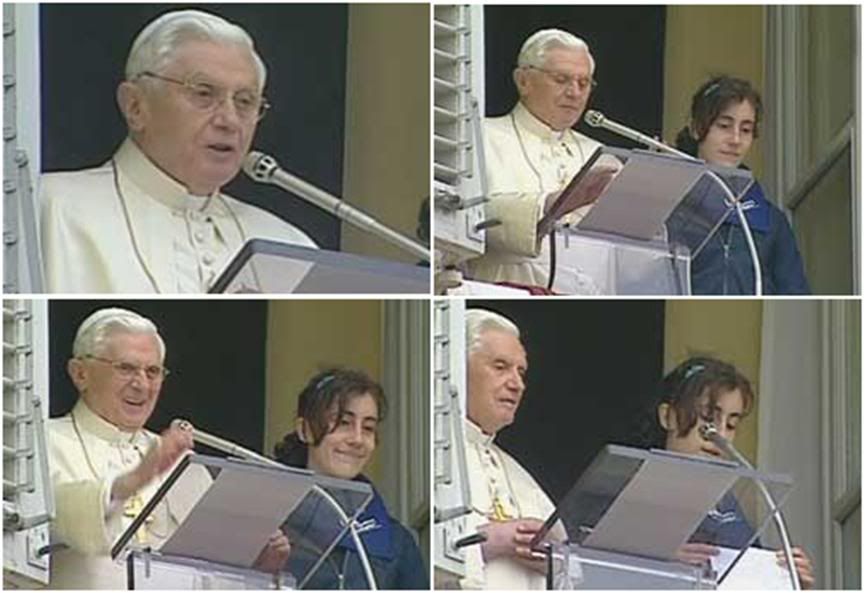
Here is a full translation of the Holy Father's words before the Angelus prayers:
Dear brothers and sisters:
One of the readings in the liturgy of this Sunday is one of the most beautiful pages of the New Testament and of the entire Bible: thee so-called 'hymn to charity' of the Apostle Paul (1 Cor 12,31-13,13).
In his first Letter to the Corinthians, after having explained with the image of the body that the various gifts of the Holy Spirit contribute to the good of the one Church, Paul then indicates the 'way' to perfection.
This, he said, does not consist in possessing exceptional qualities - speaking new tongues, knowing all the mysteries, having prodigious faith or performing heroic acts. Rather, it consists of charity - agape - which is authentic love, that which God revealed to us in Jesus Christ.
Charity is the 'greatest' gift, which gives value to all the others, although "it is not pompous, it is not inflated", rather, "it rejoices with the truth" and the good of others.
He who loves truly "does not seek his own interests... does not brood over injury... bears all things, believes all things, hopes all things, endures all things" (cfr 1 Cor 13,4-7).
In the end, when we come face to face with God, all the other gifts will not matter: the only one that will remain eternally is charity, because God is love, and we shall be similar to him, in perfect communion with him.
For now, while we are in this world, charity is the distinctive mark of the Christian. It is the synthesis of all his life: of what he believes, and what he does. Thus, at the start of my Pontificate, I wanted to dedicate my first encyclical to the subject of love: Deus caritas est.
As you may recall, this encyclical has two parts, which correspond to the two aspects of charity: its meaning, and then, its practical applications.
Love is the essence of God himself, it is the meaning of creation and history, the light which gives goodness and beauty to the existence of every man.
At the same time, love is, so to speak, the 'style' of God and of the believer; it is the behavior of he who, responding to God's love, sees his own life as a giving of himself to God and to his neighbor.
In Jesus Christ, these two aspects form a perfect unity: He is love incarnate. This love was revealed to us fully by Christ crucified. Looking up to him, we can confess with the Apostle John: "We have come to know and to believe in the love God has for us" (cfr 1 Jn 4, 16; Enc. Deus caritas est, 1).
Dear friends, if we think of the saints, we can recognize the variety of their spiritual gifts, and even of their human personalities. But the life of each of them is a hymn to charity, a living canticle of love for God.
Today, January 31, we particularly commemorate St. John Bosco, founder of the Salesian Family and patron of the youth. In this Year for Priests, I wish to invoke his intercession so that priests may always be educators and fathers to the youth; and so that, experiencing their pastoral charity, many young people may welcome the call to give their life for Christ and for the Gospel.
May Mary Help of Christians, model of charity, obtain these graces for us.
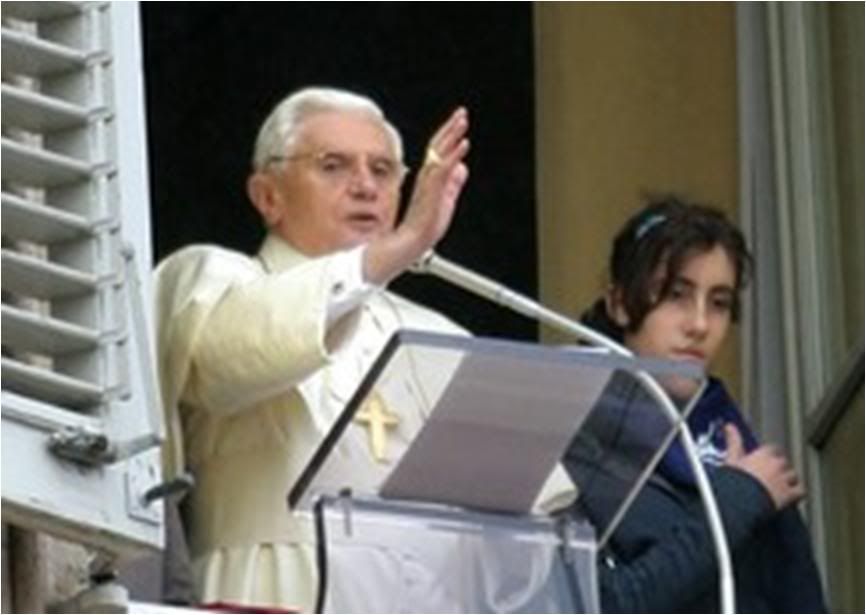
After his plurilingual greeting to various pilgrim groups, the Holy Father and two children om the youth arm of Student Catholic Action released the peace doves:
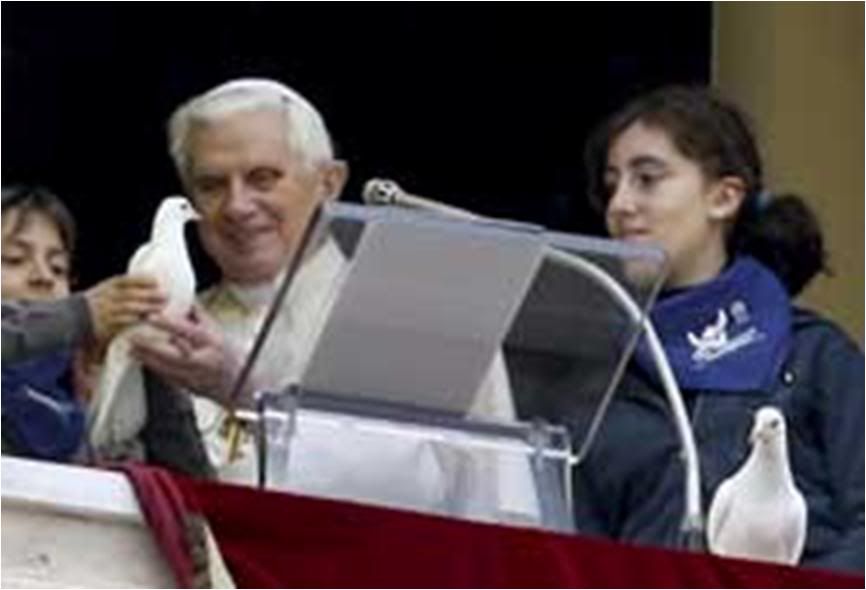
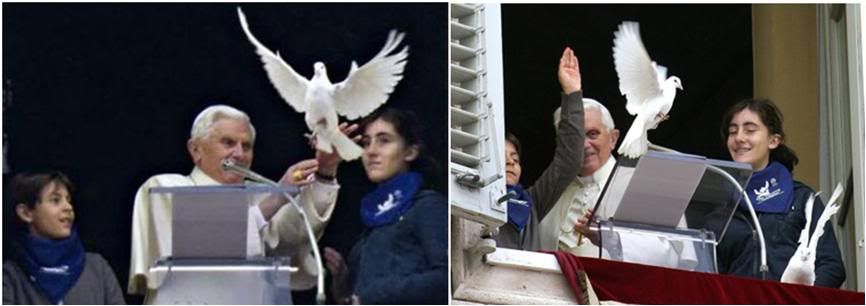
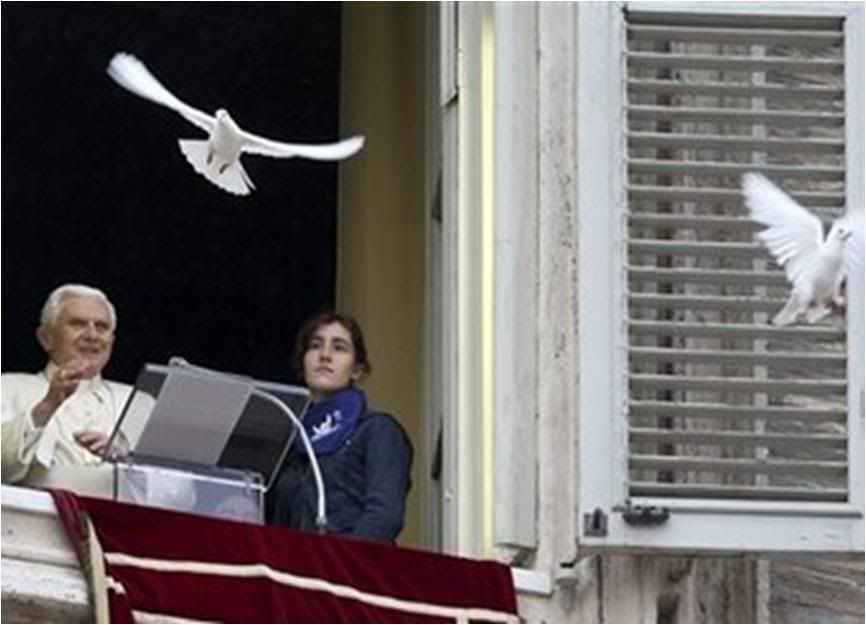
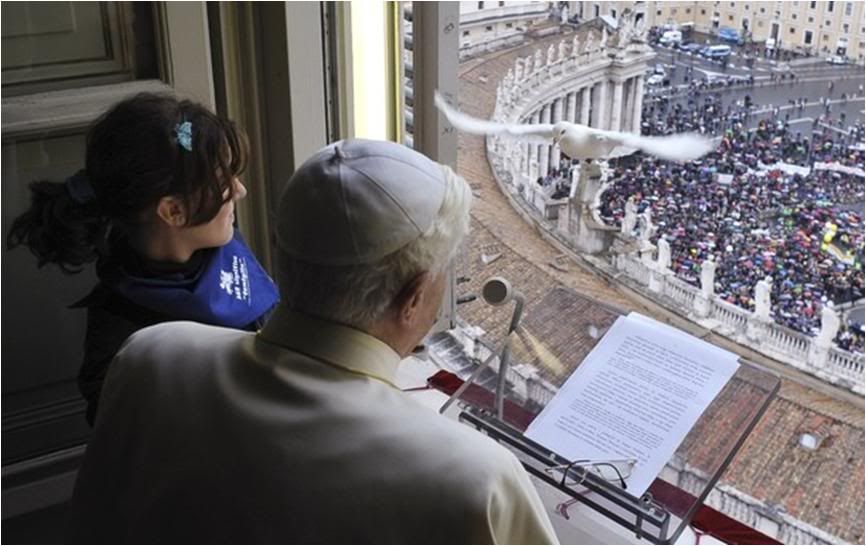
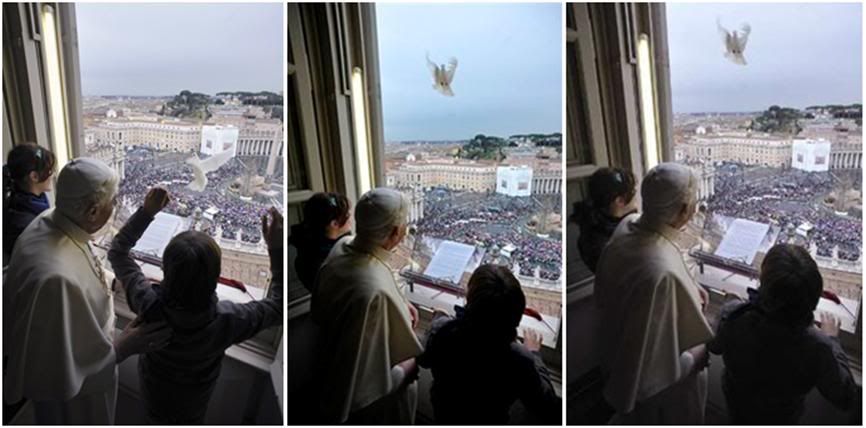
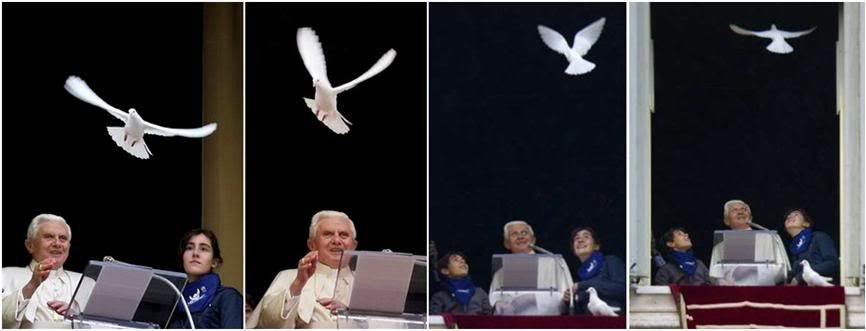
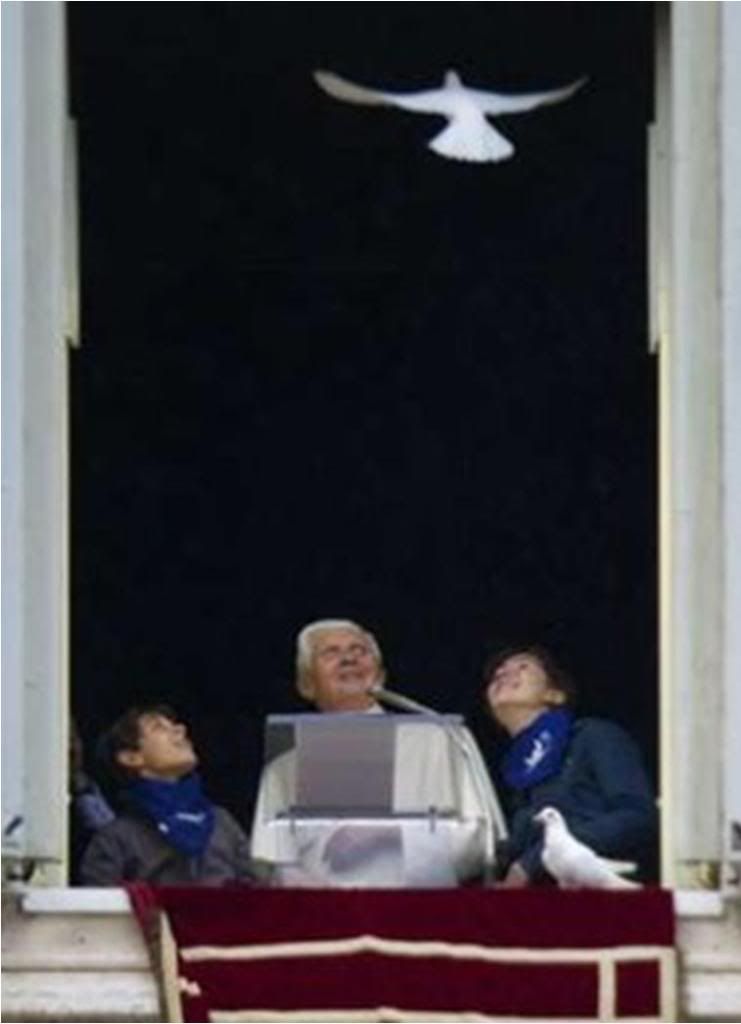
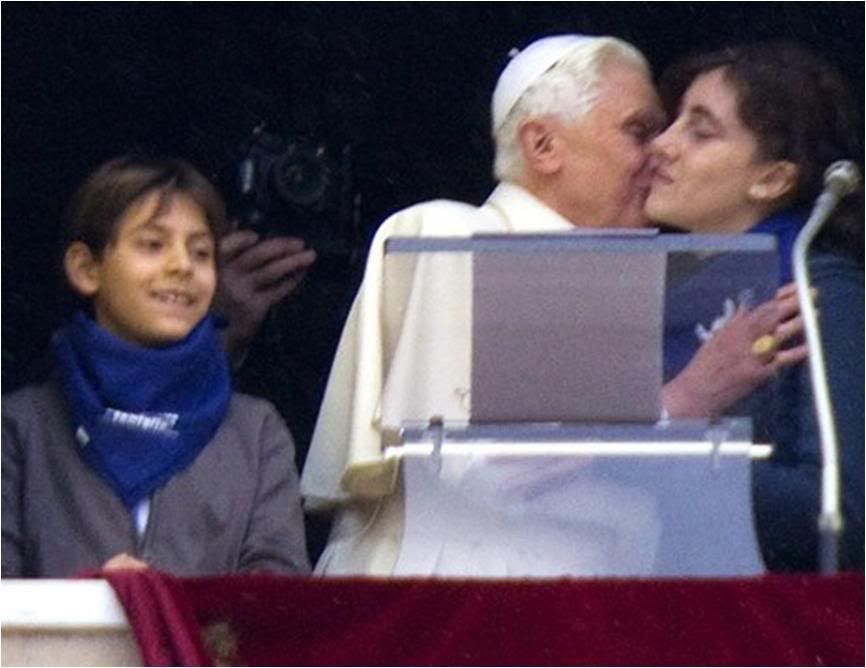 Pope calls on business
Pope calls on business
and government to save jobs

VATICAN CITY, Jan. 31 (Reuters) – Pope Benedict on Sunday called on businesses and officials to help stem job losses because of the economic crisis and made an explicit reference to two Italian plants expected to be shut down soon.
"The economic crisis is causing the loss of many jobs and this calls for a huge sense of responsibility by everyone: entrepreneurs, workers, governing officials," the Pope said after his weekly Angelus blessing.
"I think of some difficult situations in Italy, like, for example, Termini Imerese and Portovesme ... Do everything possible to protect and spur job growth, assuring dignified and adequate work to sustain families."
U.S. aluminum producer Alcoa Inc. has said it will shut down its Portovesme and another Italian plant next month and carmaker Fiat has announced plans to shutter its Termini Imerese plant in Sicily.
Some Alcoa workers from the Portovesme plant who risk losing their jobs held up a banner in St. Peter's square during the Pope's address to the faithful.
The Pope in the past has said the financial crisis needs more than a quick fix and has called for solidarity to fight poverty that has been exacerbated by economic woes.
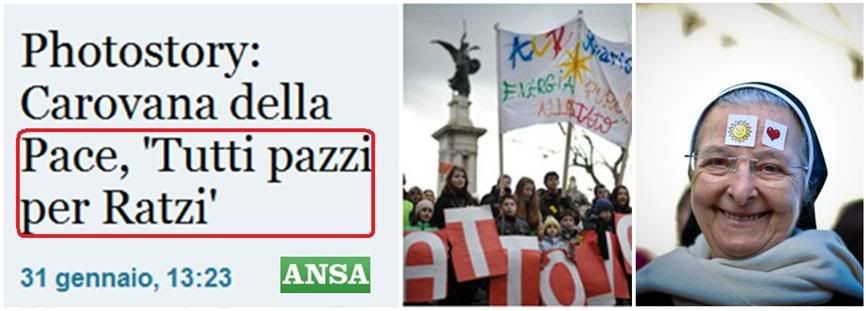 Translated from
Translated from

January 31, 2010
Streamers in praise of peace, alongside those identifying their respective parishes, as well as a multicolored streamer expressing great love for the Pope with the new familiar words 'Tutti pazzi per Papa Ratzi" [We're all crazy for Papa Ratzy!]
With songs, slogans, and much gaiety, some 50,000 children and youth representing the youth arm (ACR - Azione Cattolica Ragazzi) of Rome's Catholic Action paraded through the streets of Rome from Piazza Navona to St. Peter's Square im the annual Caravan for Peace.
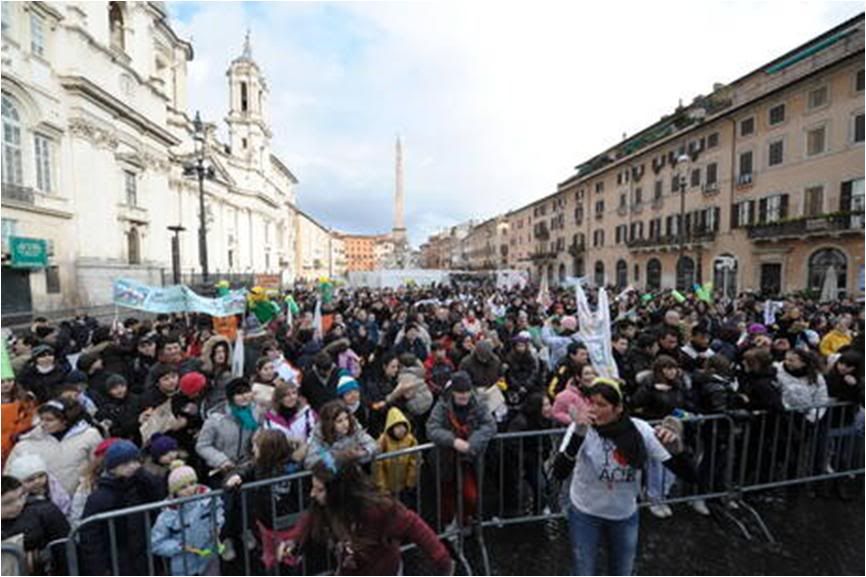
"Siamo in onda: la pace ci circonda" [We're all on the same wavelength - peace surrounds us] was the slogan they chose for this year.
Organizers said the idea represents "the itinerary carried out by the parochial groups on the theme of communications and learning how harmony with others contributes to creating a lasting peace".
The young people, with their teachers and families, gathered at Piazza Navona first, where Cardinal Agostino Vallini, the Pope's Vicar in Rome, addressed them before the start of the festive march.
At St. Peter's Square, they took part in the Angelus prayers, during which two children representing them were with Pope Benedict XVI as he addressed the faithful from his study window, and later assisted him in releasing two doves symbolizing peace.
The young people also joined in the Prayer of Intercession for Peace in the Holy Land.
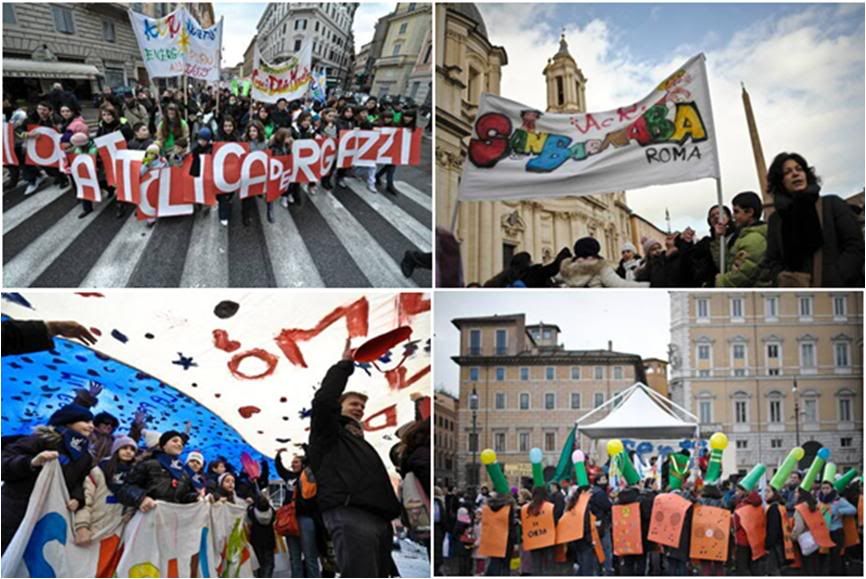 Curiously, ANSA's photo coverage did not include a picture of the "Tutti pazzi' streamer, but here are two from previous gatherings.
Curiously, ANSA's photo coverage did not include a picture of the "Tutti pazzi' streamer, but here are two from previous gatherings.
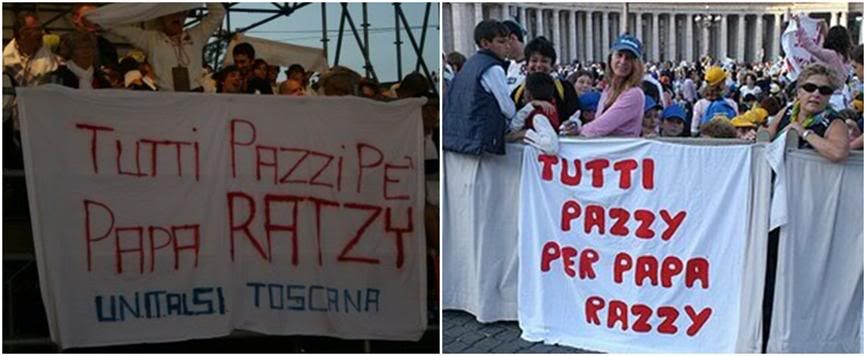
\
[Modificato da TERESA BENEDETTA 01/02/2010 16:04] |
| |
 31/01/2010 23:26 31/01/2010 23:26 |
|
| | | OFFLINE | | Post: 19.387
Post: 2.029 | Registrato il: 28/08/2005
Registrato il: 20/01/2009 | Administratore | Utente Veteran | |
|

 The positive realism that is bringing
The positive realism that is bringing
the Vatican and China closer together
by Lucio Brunelli
Translated from

January 31, 2009
There is a way that rejects any dialog a priori, every dealing with the 'enemy', which gratifies a vain image of one's purity, but does not bring any concrete good to one's own community.
There is also a hard-fought search for compromise, a discreet flexibility which perhaps may not sound heroic, does not gain applause, but brings about a real improvement, the best that is possible under a specific historical circumstance.
Which then is the more just, more moral attitude? That is the dilemma that Benedict XVI faced with the Catholic community of about 15 million in the immensity of mainland China.
In the time of Mao Zedong, the policy of the regime was brutally clear: to extirpate every trace of God, to throw priests and bishops into jail, to close down all the churches.
At the end of the 1970s, things changed with Deng Xiaoping - churches reopened, worship was allowed, but on condition of vowing independence from the Pope to form a 'patriotic' national Church.
The margins for compromise appeared so narrow that many priests chose to operate underground. With the Vatican's approval, many bishops were consecrated secretly as 'clandestine' bishops, as opposed to the 'patriotic' bishops named by the regime.
Now, we are in a third phase that is more pragmatic. Most of the 'patriotic' bishops, secretly linked to Rome, have obtained pontifical recognition. Between the Vatican and Beijing direct contacts have begun that have so far to produced some results: almost all the new bishops have been chosen by a sort of parallel consensus between Rome and Beijing.
Thus a new generation of priests is emerging who act within the official structure - with the administrative limits and controls imposed by the government, but carrying out their essential activities of catechesis, prayer and witness rather normally. They are, at the same time, one with Rome, even if direct physical and institutional contact is still forbidden between the local Catholic hierarchy and Rome.
It is a situation Benedict XVI is perfectly aware of. In 2007, he wrote a historic letter to the Catholics of China in which he took note of the new reality and called on 'clandestine' andd 'official' Catholics to reconcile and to work together.
The greatest resistance to the Pope's instructions have come from the hardline, 'pure' Catholics who grew up in the time of the 'catacombs'.
The latest issue of the magazine 30 GIORNI recounts an emblematic case - that of the auxiliary Bishop of Baoding, Francis An Shuxin. Formerly an underground bishop, with ten years of jail behind him, he decided in 2006 to operate within the official system, while writing down for the civilian authorities his clear intention to stay in communion with the Pope.
He informed the Holy See of his decision, and the Vatican supported him. But the clandestines cried he had betrayed them, organized 'political' campaigns against a bishop they considered collaborationist, and spread stories about him in the Western media to put him in a bad light.
It is a sad and complex situation. The reaction of the underground priests, especially those who in various ways continue to suffer the obtuse and often brutal policies of local functionaries, must certainly be understood and they should not be ostracized. But there is no future for them.
If only because the Great Wall is not about to come down as did the Berlin Wall. And it is precisely a Pope who does not compromise on doctrinal points who also understands that there is no better alternative at this time, for the good of the Church in China, to patient dialog, to negotiation, to a policy of taking small steps when dealing with the giant of Asia.
NB: One of this small 'big steps' is the authorized publication in Chinese of a book of traditional Christian prayers distributed in China by 30 GIORNI, which carried an introduction by Cardinal Joseph Ratzinger when it was issued in Italian in 2005.
[Modificato da TERESA BENEDETTA 31/01/2010 23:30] |
| |
 01/02/2010 04:53 01/02/2010 04:53 |
|
| | | OFFLINE | | Post: 19.388
Post: 2.030 | Registrato il: 28/08/2005
Registrato il: 20/01/2009 | Administratore | Utente Veteran | |
|

 St. Augustine is very much on the mind of Italians this Sunday and Monday with the broadcast of the TV film 'Augustine'in two parts, which was previewed by Benedict XVI in abridged form last September.
St. Augustine is very much on the mind of Italians this Sunday and Monday with the broadcast of the TV film 'Augustine'in two parts, which was previewed by Benedict XVI in abridged form last September.
The film, a co-production by an Italian company with Bavarian TV, was born from a suggestion made by the Holy Father before his visit to Bavaria in 2006.
Speaking to German media representatives, he had remarked: "Make a film on Augustine, for example, to show that film subjects need not be about terrible situations. There are marvelous figures in history who are far from boring and whose lives are still very relevant."
At the same time, the Vatican publishing house has come out with a collection of Benedict XVI's papal texts on St. Augustine, the figure who has most influenced his work as a theologian, which was reviewed earlier this month in Avvenire.
Augustine & Benedict:
Battling the heresies of today
by Giuliano Vigini
Translated from

January 12, 2009
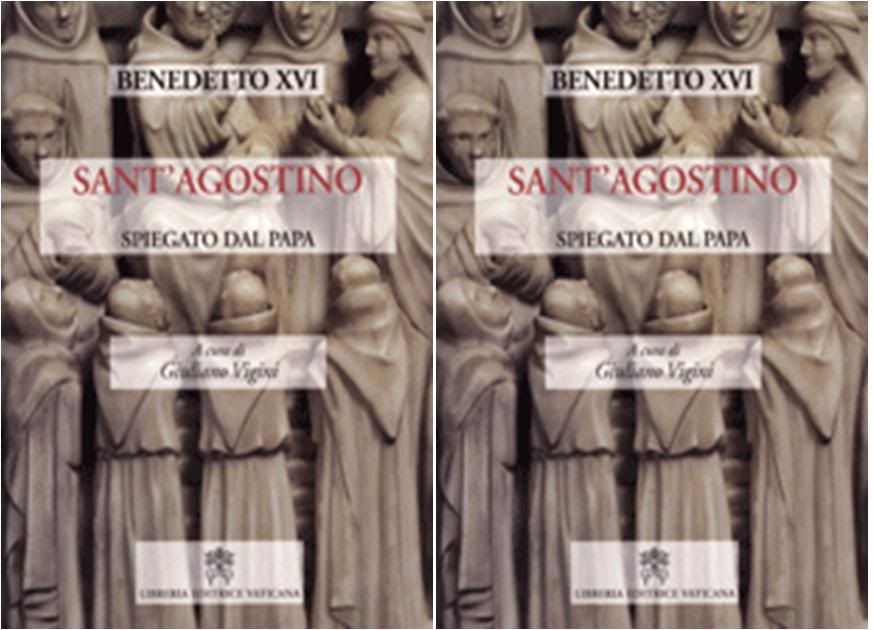
Benedict XVI's frequent references to St. Augustine tells the story of a long friendship that started in Joseph Ratzinger's youth.
Cultivating and deepening his knowledge of Augustine's work, Joseph Ratzinger entered into full harmony with it, grasped its 'newness' and revelled in the enjoyment of a kindred spirit.
Augustine became the subject of his doctoral dissertation at the University of Munich in the academic year 1950-1951. This led young Prof. Fr. Ratzinger to inquire further and to understand in a fresh manner the sacramental nature of the Church, through the Christological and ecclesiological thinking elaborated by Augustine, in whose vision and action, nothing is separated, everything tends to interact and compose together a fruitful harmony.
In fact it is obvious that the doctrine of Augustine left a deep mark on the young Ratzinger.
In the courses, seminars and lectures that he gave in the theological faculties of four German universities - Bonn, Muenster, Tuebingen and Regensburg - from the late 1950s to 1977 when he was named Archbishop of Munich-Freising, Augustine was his constant point of reference - one of the inspirational bases for his theology as well as a spiritual lighthouse of his Magisterium.
For Benedict XVI, the turbulent course of Augustine's life and his eventual anchoring in the faith was characterized above all by a 'passion for the truth', as he recalled during the solemn Eucharistic concelebration in the Orti Borromaici (Borromeo Gardens) of Pavia when he came to pay homage to the remains of Augustine (April 22, 2007).
This was not truth understood as an abstract philosophical principle, but as a tangible reality - not a remote mirage, but an incarnated truth. In which it is faith that throws wide open the horizons for such truth, leading to that essential link between 'intelligere' (to understand) and 'credere' (to believe) in the context of reason and the authority of faith, faith as thought and faith as lived.
But first of all, there was the humility with which Augustine set out to open the doors to the mystery of God - the humility to which every Christian is called: "The humility of God's incarnation should match the humility of our faith," Augustine wrote, "which lays down all-knowing arrogance and bows down when it enters to become part of the community of the Body of Christ".
After his journey to conversion and coming home to the faith, Augustine proved his humility, the Pope underscored, in the sacrifice of his own dreams (above all, once he had become a priest, to devote himself to the contemplative life), to become a living Gospel among men. In the crossroads of life - when one chooses to go one way but God asks us to go the other - such humility is required.
Augustine had the humility, placing himself totally in the service of others: "Ever anew, to be there for everyone, not for one's own perfection; ever anew, to be with Christ, to give one's life so that others may find him, who is true Life".
Augustine's humble faith was shown even in his endless desire for God's mercy. His was not the attitude of someone who has received the gift of grace once and for all, but on the contrary, of someone who all his life considered himself to be 'a mendicant of God' (mendicus Dei) and therefore continued to seek him to obtain his pardon and help.
This aspect of Augustine also highlights the urge for 'permanent conversion' together with 'the grace of perseverance' which we must pray for daily to the Lord.
Finally, the passion for truth, which in Augustine finds its outlet in his faith in Christ and in the Church, is also expressed as a great passion for man. Faith does not close one's doors, it does not isolate, it does not abandon reason and freedom, it does not exclude anything.
Rather, faith opens up, expands, orients and leads, because faith in 'God Love' (1 Jn 4,8.16) is that which manifests itself as an expansion of love, and the Church is most herself to the degree that it is a community of love.
Benedict XVI's first encyclical, Deus caritas est - which he symbolically gave to the world in front of Augustine's tomb - and which "owes very much to him" - is, in fact, a mirror of the commandment of charity, lived as service to truth and Christ's love.
In presenting Augustine, Benedict XVI arrives at the heart of his teaching, from which he has drawn the thoughts, words and examples that constitute the guidelines for his own Magisterium. Augustine is a mirror that reflects part of him.
In reviewing his theological, spiritual meditative and cultural works, one can truly grasp the Augustinian line that inspires and holds together his reflections.
There appear two be two cardinal concepts along which Benedict XVI develops his thought: truth and unity.
Truth understood as a 'symphony' according to an ancient concept revived and made famous by Hans Urs von Balthasar.
Unity understood as communion in the truth, where differences do not splinter into ruinous particularisms, but act as a bond in a reciprocity of love that always looks at the greater good, the truth - full, total and harmonious.
Absent these premises, the approach to truth becomes a 'mono-phony' rather than a 'sym-phony' - a solo rather than polyphony.
It is what Johann Moehler - one of the theologians most appreciated by Benedict XVI (along with Newman, Rosmini, Guardini, De Lubac, Congar, Von Balthasar...) - expressed in a similar way, speaking of the sense of superior beauty one gets from the sound of a polyphonic choir: not so much because they are singing impeccably, but because the training of the singers and the wisdom of their conductor are such as to blend together different voices and tonalities into one harmony.
Such is the work of Benedict XVI, who recalls in many ways the various aspects of Augustine's preaching and pastoral action.
Already in his celebrated Rapporto sulla Fede [his interview-book with Vittorio Messori), the author faced a series of theological adn moral issues - from the concept of Church to the tragedy of morals; from liturgy to separated brothers; from the theology of liberation to feminism - making his points firmly and seeking to dissipate the numerous equivocations that have surrounded these issues.
Today, some of those questions have come back; some have changed form; and some have been added on, feeding old and new debates.
Indicating the sources of the faith and an authentic interpretation of texts, Benedict XVI always has the bar firmly centered, in which faithfulness to principles, to Tradition, to a clear and solid Christian identity, does not preclude the possibility of seeing and applying - in an intelligent and balanced way - whatever will serve to be able to live the faith ever more consciously, for the Church and for men.
If, in the time of Augustine, controversies were doctrinal in nature and his contemporaries saw the strenuous efforts of the Bishop of Hippo to combat so many heresies and deviations (Manichaean, Donatist, Pelagian, etc), today the great problems are of an ecclesial and pastoral nature, considered above all within the context of that vast subject of 'the new evangelization', in a world that is getting more secularized, within the Church as well as outside it.
All of Benedict XVI's commitment, in fulfillment of his own mandate to protect and confirm his brothers in the faith, is to remind the world of the need for a strong rootedness in Christ and the perennial values of Christianity.
These are the only true prerequisites for being Christians who are mature in living their faith and credible in bringing it to others.
That is why Benedict XVI does not tire - in the name of Augustine, who is one of the founding fathers of Western culture - to rally the faithful around the Christian foundations of Europe, which serve as the mortar holding together the idea of man himself as a sacred being because he is a creature of God and inviolable in his human and personal dignity.
Without such roots, not only will the Christian identity be lost which has spiritually and culturally shaped Europe, but the profound truth about man and his destiny will likewise be stripped away instead of being at the common heart of Europe itself today.


The TV movie stars Alessandro Preziosi as the young Augustine and Franco Nero as the older Augustine, with Monica Guerritore as St. Monica. After the special preview for him last September in Castel Gandolfo, the Pope greeted Ms. Guerritore.

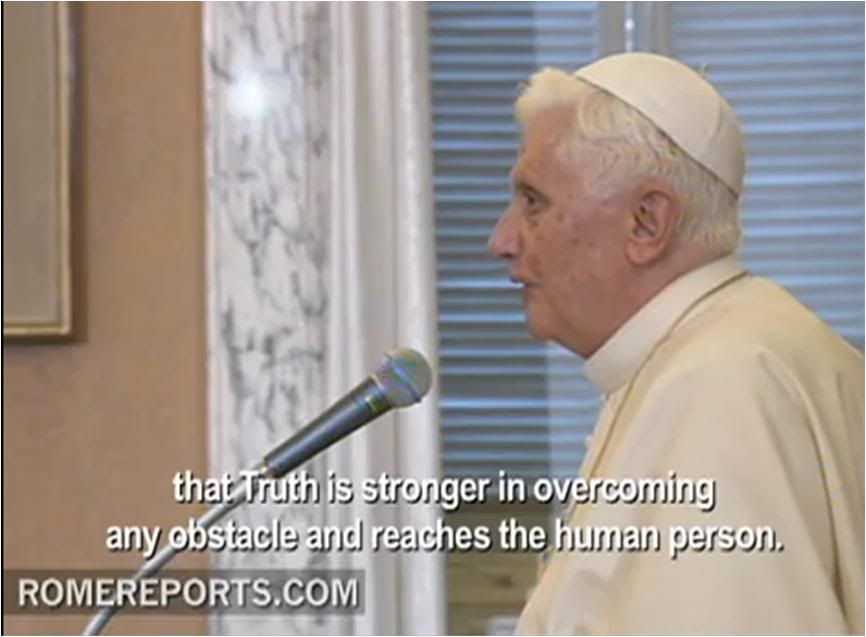
Here is what the Holy Father said extemporaneously at the time:
At the end of this great spiritual voyage that is portrayed in the film that we just saw, I feel I must say Thank you to all those who have offered us this vision.
Thanks to Bavarian TV for its generous commitment - it is a great joy that a casual observation I made three years ago* started off a journey that has brought us this great representation of the life of St. Augustine. Thank you to Lux Vide and to RAI for this realization.
In fact, the film seems to be a spiritual voyage to a spiritual continent that is very remote from us, but also very near, because the human drama remains the same.
We have seen how, in a context that is very distant for us, all the reality of human life is portrayed, with all its problems, its sorrows, its failures, as well as the fact that, in the end, Truth is stronger than any obstacle and finds man.
Externally, the life of St. Augustine may be seem to end tragically: the world in which he lived and for which he lived, is ruined. But as the film affirms, his message has lived on, and even through the continuing changes in the world, that message endures, because it comes from the Truth and leads to Love, which is our common destination.
Thank you to everyone. Let us hope that many, upon seeing this human drama, may be found by the Truth and may, in turn, find Love.
Augustine: His life
is the stuff of epics
by Roberta De Monticelli
Translated from

January 28, 2010
Fiction is fiction and can touch extreme poles of invention. It can take you to the completely imagined house of Augustine but nonetheless full of action and emotion, as all fascinating fiction is, or to a probable Augustine who is nonetheless more plausible than a picture of plain truth, if as Aristotle says, poetic possibility inherently goes beyond true stories, which happen by accident, as it were.
The televiewer can judge, in this film on Augustine. I would like to indicate at least two aspects which make this man who lived more than 1600 years ago a partner in dialog for all of man’s contemporary doubts – certainly much more than most bishops living today.
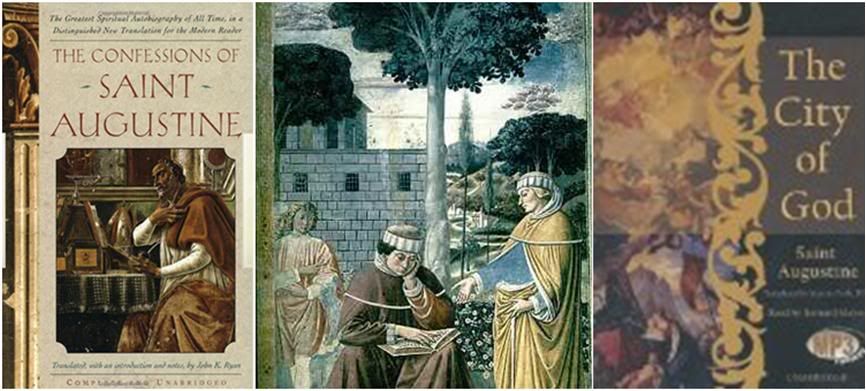
Augustine, besides being the supreme Father of the Western Church, was also a bishop who had powers far different from that of a contemporary bishop. In that era of enormous geopolitical turmoil, of the collapse and rejection of all the structures of material and moral government in human society.
If Augustine the philosopher was great, detached from all violence, luminous in his questioning, serene in his reasoning, contemplative even in the passion of his research, Augustine the bishop was disconcerting! He persecuted heretics pitilessly.
His Confessions embodies all the essentials of human life: childhood and adolescence, lust and love, mourning, friendship, ambition, intellectual inebriation, the torments of the soul; the journeys, roads and vities of the Roman empire; the elite and the common people; interior conflict, radical choice, the times itself, memories and God.
And yet, from the viewpoint of events and real action, nothing really happens before the first great turning point of his conversion and the brief spring of his new life, before he returns to his native Africa and takes on his ecclesial responsibilities.
But the last chapters of that autobiography, chapters we might describe as ‘pacified’, no events ‘happen’. at all but everything does in his theological and metaphysical thinking. In Books X-XIII of the Confessions, he lays down all the foundations and supporting vaults of Western thought, or if you prefer, of European civilization and culture.
Definitely Christian, certainly. But it is precisely its surprising aspects – incredibly still so much ignored – of Augustinian theology and spirituality that we wish to remind the reader, aspects that respond so much to our contemporary doubts.
The first aspect is the sovereign freedom with which Augustine invites everyone to read and understand the Bible. "The mind is nourished only by that which makes it rejoice”, Augustine writes in Book XIII of Confessions – the book that is dedicated to the Spirit.
Today, one must advise fundamentalists, not only American, who continue to perversely maintain a cosmogonic reading of the Bible, that Book XIII, the last of Augustine’s Confessions, is an exegesis of Genesis which radically applies the principle of the spirit precisely where the letter (literalness) kills it. It is a spiritual exegesis, for which we can also use the terms symbolic and allegorical.
Creation is seen as a sensory offering - the world as it appears to the new man, the renewed or recreated man, the man reborn in the spirit. But the perspective that strikes us is that creation here is seen as ‘re-creation’, a rebirth of the spirit to the experience of things and men, in which every entity is seen as closer to its essence and recovers a ‘transcendent’ sense – one that goes beyond the obvious, or what is taken for granted – to every routine action, to every quotidian gesture. A process that takes place invisibly, beyond the worn-out words we use.
A great contemporary poet, Mario Luzo, would say of Augustine’s Confessions: It shows us the world as at its nascent stage, with each thing situated “within the pullulating presence of their continuing origin".
This particular book of the Confessions can be seen as a grand theory of inspiration. In the spirit, the power of memory and the actuality of experience are found in an ignition of love, the instant in which the living word is born. The ‘fruit’ of the spirit is thus the flowering – almost proliferation – of sensory images, the ‘forest of symbols’ in our life, whose text, Scriptures, becomes transformed in Augustine’s writing.
Dante would echo this theory of inspiration: “I am one who am the scribe of love; that, when he breathes, take up my pen, and write as he dictates."
The second aspect of Augustine’s relevance concern the most famous pages of the Confessions: those about eternity and time. Time was born with the world – it is just one of its dimensions, as contemporary physicists believe. “There was never a time when there was no time”. Once more, one thinks of the American fundamentalists who have transformed the poetry of the seven days of Creation into a kind of primitive cosmogony.
But the solid and foursquare Thomas Aquinas, who knew his Augustine well, tells us that the when and how of space-time, whether they are finite or infinite, how they came to contain what they contain, is not pertinent at all to theology [???], and that moreover, the novelty of scientific discoveries, their novelty compared to what is ordinarily perceptible, is just one of the aspects of the world seen as creation,
Then, there is another aspect of the renewed interest in Augustine.
Augustine: A saint for
the global era and the Internet
by Armando Torno
Translated from

January 28, 2010
Augustine of Hippo comes to the small screen in Italy Sunday and Monday in two installaments – Benedict XVI previewed a synthesis of the two parts at the Vatican last autumn . But he iis already on the Net – all his writings.
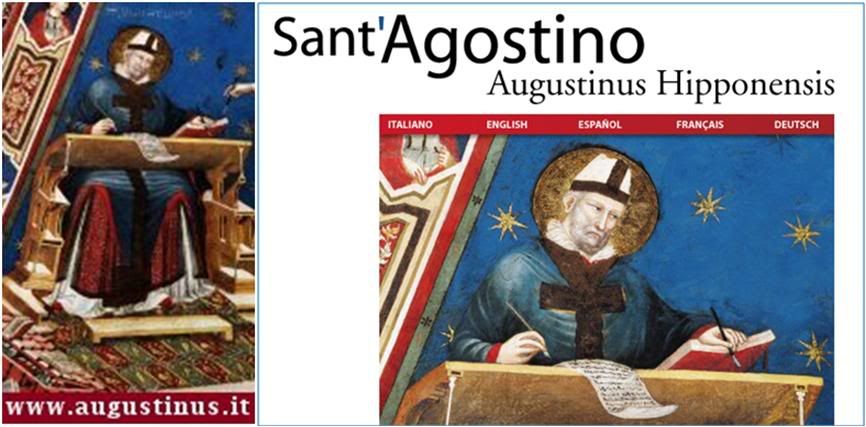 www.augustinus.it/links/inglese/index.htm
www.augustinus.it/links/inglese/index.htm
The Italian publishing house Citta Nuova, which promoted the initative, recently completed online publication of Augustine texts in more than 70 volumes – it is now completing the indexes and Augustine’s references, to be followed by iconographic supplements and subsequent other enhancements. The texts comprise more than 50,000 pages; 80 Augustinian scholars worked on the compilation.
To give an idea of the project scope, it is as though Augustine had written The Divine Comedy 100 times and Manzoni’s I Promessi Sposi 300 times. In this ocean of culture and spirituality, Augustine’s famous Confessions are ALMOST but a drop.
It is not exaggerated to believe that Augustine was the genius of Christianity. Almost every idea of the Church passed through his wRItings, and its ancient patrimony was all filtered through his pages.
It Is equally true that the saint’s immense work left traces in people like Heidegger and Einstein, inspired Luther and many Catholic reforms as well. Voltaire scrutinized him minutely in order to rebut him. Reading a page from Augustine prompted his remark: “Have you read the Pathers of the Church? Yes, but they will pay for it!”
Libertines have used the Confessions as a model for better knowing themselves, as in a fascinating work by Laurence Tricoche-Rauline, Identité(s) libertine(s) (Honoré Champion, Paris 2009). The mystics venerated him. Popes have studied him, especially Benedict XVI.
A novelist like Julien Green said: “St. Augustine never disappoints... He is always ahead of any era in which he is read”. Karl Jaspers in his book The great philosophers ranks him as one of the three creators of Western thought with Plato and Kant.
But to get back to Augustine online. To better focus this signal event, we spoke to Remo Piccolomini, editor of the Nuova Biblioteca Agostiniana [New Augustinian Library; Franco Monteverde, general editor of the volumes and author of the indexes; and Lorenzo Boccanera, electronic engineer and Webmaster of the site. At www.augustinus.it one can choose to read Augustine in Italian, English, French, Spanish and German.
Two search engines allow navigation through the pages similar to Google’s for news items. Search mechanisms are constantly being improved and enhanced daily. In 2005 before the site was completed, it had 100,000 hits. This year, at least 3 million are expected. It must not be forgotten that until 1986, Citta Nuova was publishing Augustine’s works on paper.
If Lorenzo Boccanera considers his task to be the equivalent of a ‘modern scribe’, Franco Monteverde must read and reread the Complete Works to construct his indexes, he had started this with the usual index cards as people did until about 20 years ago but now he has the benefit of advanced software to do it.
He has absolutely no doubts: “Augustine can explain the great truths of the faith even to illiterates. He always manages to surprise, even when you have reread him many times. He lovingly draws his reader to his thought, almost as if he were taking him by the hand”. [In this, as in the content of the thought itself, his most illustrious contemporary follower has followed his model!]
Remo Piccolomini, who has inherited the great work done by Agostino Trapè — who founded Citta Nuova in 1954 and was one of the great scholars of Patristics [study of the Fathers of the Church] – believes that “Augustine is unlike any author. He had been everything – the young man who lived a brilliantly worldly life and the saint: he was a citizen of the world not a mere intellectual. He was truly ‘modern’ in that his pages continue to resound today with relevant ideas. Papini once said that he was one of those rare men who fail to die.”
It must be said that Citta Nuova’s enterprise has no equivalent. Spain’s BAC (Biblioteca de Autores Cristianos) has tried something simliar, but theirs have no supplements and indexes, no illustrations and iconography are planned, and the editorial effort cannot match the incredible authoritativeness of the Italian team.
The Citta Nuova online Augustine also offers helpful tips – such as identifying the topics most sought and those which require greater examination in depth for their actual relevance. One can organize a personal concordance to check out various points of interest that would never have been possible only with one’s memory, thus enabling a clarification of such points.
All this is important for theology, philosophy, history, literature and general culture – but not even the world of politics should make the mistake of ignoring it.
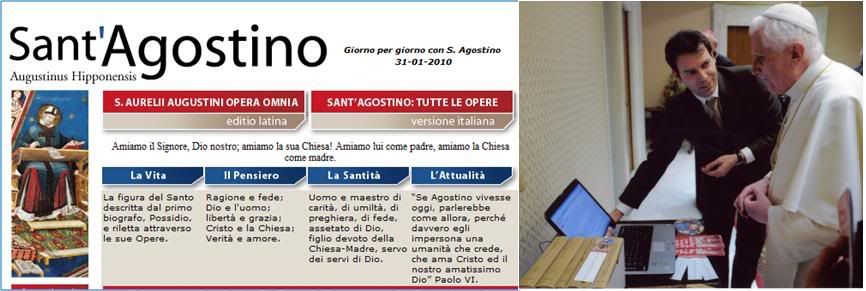 A Citta Nuova techie shows the features of Augustine online to the Holy Father.
A Citta Nuova techie shows the features of Augustine online to the Holy Father.
[Modificato da TERESA BENEDETTA 01/02/2010 05:19] |
| |
 01/02/2010 13:26 01/02/2010 13:26 |
|
| | | OFFLINE | | Post: 19.389
Post: 2.031 | Registrato il: 28/08/2005
Registrato il: 20/01/2009 | Administratore | Utente Veteran | |
|
 The Pope visits a museum
Translated from
The Pope visits a museum
Translated from
the Italian service of

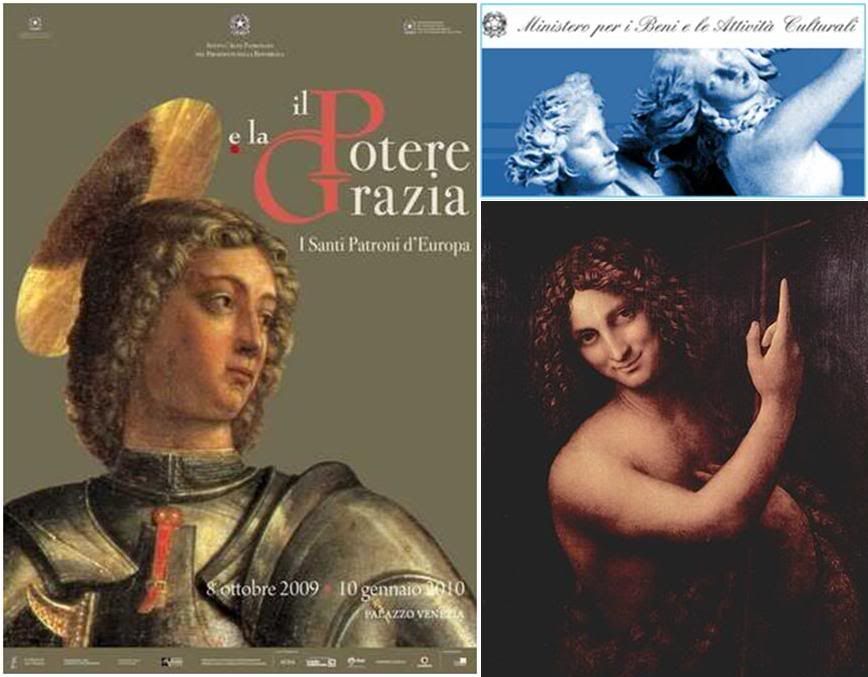 Right photo, ST. JOHN THE bAPTIST, Leonardo Da Vinci, 1513-1516, Louvre.
Right photo, ST. JOHN THE bAPTIST, Leonardo Da Vinci, 1513-1516, Louvre.
January 31 (RV) - This afternoon, Pope Benedict XVI made a private visit to the special exhibition on the art masterpieces that have expressed the influence of Christianity in the history of Europe, on the closing day of the show.
The exposition entitled “Il Potere e la Grazia. I Santi Patroni dell’Europa” (The power and the grace: The patron saints of Europe) ran from October 7 to January 31 at the national museum of art in Palazzo Venezia in central Rome. [Mussolini gave many important speeches from its balcony overlooking the Piazza Venezia.]
Presented by the Italian Ministry of Culture in cooperation with teh Pontifical Council for Culture, it brought together dozens of masterpieces from European museums by artists like Leonardo, Van Eyck, Memling, Mantegna, Caravaggio, Titian, El Greco, Van Dyck, Murillo, Tiepolo.
The objective was to show the emblematic relationship between transcendence, as testified to by the lives of Europe's great saints, and civilian society and political power in their respective times, upon which they left their mark of charity and wisdom.
 adds the following details adds the following details:
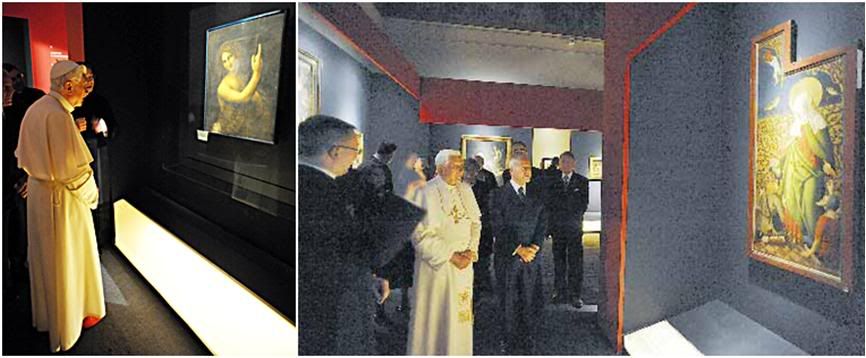
The Pope arrived at Palazzo Venezia around 6 p.m. and stayed for about 40 minutes. Welcoming him wre Gianni Letta, undersecretary to the Italian Prime Minister's cabinet; Antonio Zanardo Landi, Italiy's ambassador to the Holy See; and Fr. Alessio Geretti, exhibit curator.
Sandro Magister had an article on the exhibit last October, posted in the CHURCH&VATICAN thread:
benedettoxviforum.freeforumzone.leonardo.it/discussione.aspx?idd=859...
NB: It's probably the first time a Pope ever made a private visit to a museum!...
P.S. Belated reports in other Italian newspapers now say that among those who came with the Holy Father from the Vatican were his four Memores Domini housekeppers. It says a lot of B16 as the thoughtful 'pater familias' that he always makes it a point to have the Memores present at all the concerts he attends, and now, at the museum visit as well.
[Modificato da TERESA BENEDETTA 02/02/2010 03:57] |
| |
 01/02/2010 14:26 01/02/2010 14:26 |
|
| | | OFFLINE | | Post: 19.390
Post: 2.032 | Registrato il: 28/08/2005
Registrato il: 20/01/2009 | Administratore | Utente Veteran | |
|
 Monday, February 1
Monday, February 1
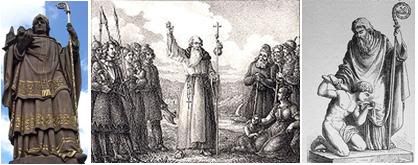 Left photo: Statue of Ansgar in Hamburg.
ST. ANSGAR (Anskar, Oskar), (b France 801, d Germany 865)
Left photo: Statue of Ansgar in Hamburg.
ST. ANSGAR (Anskar, Oskar), (b France 801, d Germany 865)
Benedictine, Missionary, Bishop, 'Apostle of the North'
Ansgar was born near Amiens and educated at the Benedictine abbey of Corbie.
When the king of Denmark converted to Christianity, he volunteered to be
a missionary there, eventually going to Sweden as well. Unsettled political
conditions forced the Christian missionaries back, and Ansgar withdrew into
Germany, where he served as first Archbishop of Hamburg-Bremen. Later,
however, he helped to consecrate Gotbert, the first bishop of Sweden. The Church
of Sweden honors him as its apostle. He spent the last 39 years of his life
preaching the Gospel, doing charitable works, redeeming captives from barbaric
tribes and fighting the slave trade in northern Germany, while maintaining
relations as best he could in Scandinavia. He was known as an extraordinary
preacher and a humble ascetic. He is the patron saint of Denmark.
Readings for today's Mass: www.usccb.org/nab/readings/020110.shtml
No OR today.
THE POPE'S DAY
The Holy Father met with
- Bishops of England and Wales (Group 4) on ad limina visit.
Afterwards, he met with all of the bishops together and addressed them in English.
THE POPE'S PRAYER INTENTIONS
FOR FEBRUARY 2010
General Intention:
For all scholars and intellectuals, that by means of sincere search for the truth
they may arrive at an understanding of the one true God.
Missionary Intention:
That the Church, aware of its own missionary identity, may strive to follow Christ faithfully
and to proclaim His Gospel to all peoples.
|
| |
 01/02/2010 16:22 01/02/2010 16:22 |
|
| | | OFFLINE | | Post: 19.391
Post: 2.033 | Registrato il: 28/08/2005
Registrato il: 20/01/2009 | Administratore | Utente Veteran | |
|


 Pope confirms he will visit Britain
Pope confirms he will visit Britain
Pope Benedict XVI said this today at the start of his address to the bishops of England and Wales who have been on ad limina visit:
On the occasion of my forthcoming Apostolic Visit to Great Britain, I shall be able to witness that faith for myself and, as Successor of Peter, to strengthen and confirm it.
During the months of preparation that lie ahead, be sure to encourage the Catholics of England and Wales in their devotion, and assure them that the Pope constantly remembers them in his prayers and holds them in his heart.
Pope Benedict XVI confirms
first state visit to UK
by Ruth Gledhill, Religion Correspondent

February 1, 2010
The Pope has today confirmed that he will be visiting Britain later this year, the first state visit to this country by the worldwide head of the Roman Catholic Church.
At the same time, Pope Benedict XVI has for the first time attacked Britain's move towards equal rights in its secular democracy, claiming that equality legislation threatens religious freedom.
In a letter [How can Gledhill commit this error? It was not a letter - it was an address he made directly to the bishops! ] today to the Catholic bishops of England and Wales, the Pope says: "Your country is well known for its firm commitment to equality of opportunity for all members of society. Yet as you have rightly pointed out, the effect of some of the legislation designed to achieve this goal has been to impose unjust limitations on the freedom of religious communities to act in accordance with their beliefs. In some respects it actually violates the natural law upon which the equality of all human beings is grounded and by which it is guaranteed."
[Trust Gledhill to go for the jugular and cite a potential flashpoint in the address, instead of first quoting the part where the Pope announces his visit, since that is the lead of her story.]
His criticisms will generate controversy and could lead to protests by secularists and gay rights campaigners during his visit.
['Could lead'? Even without her inflammatory intro, it will certainly help fuel protests which I am sure are being planned already for various reason!]
The Queen has, in the last few days, issued the formal invitation to the Pope to visit for four days in mid-September. The visit will start in Scotland and take place in Edinburgh, Glasgow, Birmingham and London, where the Pope will deliver an historic address in Westminster Hall, Parliament.
It will be the first state visit by a Pope to Britain, as that of his predecessor Pope John Paul II in 1982 was a pastoral visit only.
The only departure from normal protocol around formal visits by heads of state will be that the Pope, 83, will stay with the Papal Nuncio in Wimbledon rather than with the Queen in Buckingham Palace.
The invitation was issued amid growing speculation in Rome that the Most Reverend Vincent Nichols, regarded as the spiritual leader of five million Roman Catholics in England and Wales, is to be made a cardinal this year.
This would be unprecedented because normal practice is to have just one cardinal with voting rights in the College of Cardinals from England and Wales. The former Archbishop of Westminster Cardinal Cormac Murphy-O'Connor will retain his voting rights of the college, the body that will elect the next Pope, until his 80th birthday in 2012.
However, there is no formal rule stipulating that there can only be one Cardinal in England and Wales. There are also moves to raise the new Archbishop of New York Timothy Dolan, whose predecessor Cardinal Edward Egan is the same age as Cardinal Murphy-O'Connor, to be made a Cardinal along with Archbishop Nichols.
Although no final decision has yet been made, such a step would see the two most important Catholics archiepiscopal sees being recognised in a way that would enhance the significance of the mission of the two Archbishops on the national and the world stage.
Archbishop Nichols is at present on a five-yearly "ad limina" visit to Rome with the other Catholic bishops of England and Wales to make pilgrimage to the historic Catholic sites, meet the Pope and the head of the congregations to discuss local and international issues.
In his pastoral letter [Again, the objective error! The Pope may eventually issue the address as a pastoral letter - though I don't think that is a practice - but the statements Gledhill quotes are from his address today] issued to mark the ad limina visit today, Pope Benedict XVI said:
"Even amid the pressures of a secular age, there are many signs of living faith and devotion among the Catholics of England and Wales. I am thinking, for example, of the enthusiasm generated by the visit of the relics of Saint Thérèse, the interest aroused by the prospect of Cardinal Newman’s beatification, and the eagerness of young people to take part in pilgrimages and World Youth Days.
"On the occasion of my forthcoming Apostolic Visit to Great Britain, I shall be able to witness that faith for myself and, as Successor of Peter, to strengthen and confirm it. During the months of preparation that lie ahead, be sure to encourage the Catholics of England and Wales in their devotion, and assure them that the Pope constantly remembers them in his prayers and holds them in his heart."
After criticising equal rights legislation he continued:
"I urge you as Pastors to ensure that the Church’s moral teaching be always presented in its entirety and convincingly defended. Fidelity to the Gospel in no way restricts the freedom of others – on the contrary, it serves their freedom by offering them the truth. Continue to insist upon your right to participate in national debate through respectful dialogue with other elements in society.
"In doing so, you are not only maintaining long-standing British traditions of freedom of expression and honest exchange of opinion, but you are actually giving voice to the convictions of many people who lack the means to express them: when so many of the population claim to be Christian, how could anyone dispute the Gospel’s right to be heard?"
Archbishop Nichols, who as Archbishop of Birmingham successfully opposed moves to impose non-faith quotas on faith schools but was unsuccessful in his campaign to allow Catholic adoption societies to continue to discriminate against gay couples, is understood to have made a hugely favourable impression in Rome, increasing the likelihood of his becoming a Cardinal sooner rather than later.
His interventions in England and Wales on moral and political issues such as education and gay adoptions, where he has shown courage in espousing a conservative doctrine against the norms of liberal secularism, have also made him noticed in Rome.
The impression of an imaginative, spiritual and visionary leader will be confirmed in the next few days when he leads the Catholic bishops in his home country in issuing a pre-election document.
The document will not come down on the side of any political party but is expected to make a passionate case for the "social thought" of the Church to be uppermost in the minds of Catholics when casting their votes in May, while continuing the conservative doctrinal line espoused by Archbishop Nichols throughout his time in his previous post, Birmingham.
Eight out of the ten predecessors of Archbishop Nichols at Wesminster were made Cardinals at the first consistory after their appointments.
The College of Cardinals can have a maximum of 120 members and depending when a consistory takes place, there could be as many as seven vacancies if done this spring or summer.
Archbishop Nichols has also found favour with his diplomacy with the Church of England and the Queen, its Supreme Governor, in the face of the Pope's offer of an Anglican Ordinariate within the Catholic Church for disaffected High Church and former Anglicans.
At a meeting with Earl Peel, the Lord Chamberlain, Archbishop Nichols was able to reassure him that the decree was not an attempt to poach Anglicans but a response to a particular pastoral situation.
So far, the members of the Traditional Anglican Communion, former Anglicans based mainly in Australia, seem likely to be the first to take up the offer. Anglo-Catholic bishops and clergy in the Church of England, who are concerned about moves to ordain women bishops, are still considering their position.
In today's pastoral letter, the Pope said he believed the Anglicans who converted would be a "blessing for the entire church."
 had this report: had this report:
LONDON, Feb. 1 (AFP) – Pope Benedict XVI has confirmed he is to visit Britain for the first time as Pontiff, a Vatican official said Monday.
During an address to Catholic bishops from England and Wales making a pilgrimage to Rome, the Pope spoke of the "living faith and devotion" of Catholics in Britain.
"On the occasion of my forthcoming apostolic visit to Great Britain, I shall be able to witness that faith for myself," he added in comments Monday quoted to AFP by Alexander Desforges, director of the Catholic Communications Network.
Pope Benedict said he hoped to help "strengthen and confirm" the Catholic faith in Britain.
Desforges said no dates had yet been set for the visit. But it is believed the Pontiff will come to Britain in September and will likely stay for several days.
"There are no dates at the moment. Discussions about the programme and the specific dates are ongoing," Desforges added.
Last year, Scottish Secretary Jim Murphy was quoted as saying ministers had drawn up an itinerary of public masses and ecumenical functions for a papal visit on September 16-19 this year.
Pope John Paul II was the last Pontiff to visit Britain, in 1982, and was received at Buckingham Palace by Queen Elizabeth II, who is the titular head of the Church of England. He was the first Pope to make the trip for 450 years. [The first Pope ever to visit there! It's not as if Popes had travelled there before the Church of England was established by Henry VIII to protest Vatican disapproval of his divorce and remarriage!]
I do not usually post repetitive news items, but on this occasion, a look at how the various UK MSM are reporting the Pope's address today gives an idea of their respective leanings:
Pope Benedict confirms
first papal UK visit since 1982

February 1, 3010
Pope Benedict XVI has confirmed he will visit the UK later this year.
The Pontiff spoke of the plan for his first apostolic visit in an address to Catholic bishops of England and Wales at the end of their pilgrimage to Rome.
The Pope is expected to visit Birmingham - as part of the planned beatification of Cardinal John Newman, and Scotland.
He has been formally invited by the prime minister. The last Pope to visit the UK was John Paul II in 1982.
No dates or official itinerary have yet been set for the visit but officials at the Vatican and in the UK told the BBC it was likely to take place in September. [ Sept. 16-19 are the dates previously reported.]
Further details are expected early in March, a spokesman for the Catholic Communications Network said.
The Pope was formally invited to visit the UK by Prime Minister Gordon Brown last February. Scottish Secretary Jim Murphy also invited him to visit Scotland.
In the speech, published on the Vatican Radio website, Pope Benedict offered his "warmest good wishes and prayers" for the bishops and all the faithful entrusted to their care.
He urged them to warmly welcome disaffected Anglicans who wanted to join the Catholic Church.
Anglican Archbishop of York John Sentamu said the Pope would be "very welcome".
He told BBC News: "I've met him in Rome. We had wonderful conversations and whatever people may think about the ordinariate, they shouldn't use that as a reason for not accepting one of our great Christian leaders."
The Catholic Church has offered disaffected Anglicans the prospect of their own hierarchies - ordinariates - within the Catholic system, leading to predictions that whole congregations opposed to plans for women bishops might transfer from the Church of England.
During his speech, in an apparent reference to the Church of England's stance on issues such as gay adoption, the Pope urged the bishops to ensure that its moral teaching was always presented in its "entirety" and "convincingly defended".
He said: "Your country is well-known for its firm commitment to equality of opportunity for all members of society.
"Yet, as you have rightly pointed out, the effect of some of the legislation designed to achieve this goal has been to impose unjust limitations on the freedom of religious communities to act in accordance with their beliefs.
"In some respects it actually violates the natural law upon which the equality of all human beings is grounded and by which it is guaranteed."
He also urged the bishops to continue to insist upon their right to participate in national debate through "respectful dialogue with other elements in society".
By doing so, the Pope said, they would be "maintaining long-standing British traditions of freedom of expression and honest exchange of opinion" as well as "giving voice to the convictions of many people who lack the means to express them".
The National Secular Society (NSS) said it would mount a protest campaign made up of gay groups, victims of clerical abuse, feminists, family planning organisations and pro-abortion groups among others.
President Terry Sanderson said: "The taxpayer in this country is going to be faced with a bill of some £20m for the visit of the Pope. [I don't know if there is any basis for that claim, but in any case, the BBC should have inserted a line in its report to state the relevant and correct fact.]
" A visit in which he has already indicated, he will attack equal rights and promote discrimination. [That is the sort of downright falsehood and calumny that anti-Church bigots indulge in! I'm afraid we must brace ourselves for that sort of garbage getting good play in the British media between now and the Pope's visit, during which it will all get as much coverage as the viisit itself!
"We have a petition online where people can make clear their opposition to the state funding of this visit. If the Catholic Church wishes its leader to come here, it should pay for the visit itself."
[You ignoramuses! Every government always has to foot some part of the bill for visits made by world leaders, if only because it is the local government's ressponsibility to insure their security. The local Church does pay its share for everything else, but it raises the money from Catholics.]
The Daily Telegraph at least saw fit to enlighten non-UK readers about the so-called Equality Bill and that Christian members of Parliament actually voted down a portion of it that has terrible implications for imposing certain practices on all religious institutions!
Pope Benedict XVI criticises
‘unjust’ effects of Equality Bill
By Martin Beckford, Religious Affairs Correspondent

February 1, 2010
Pope Benedict XVI has criticised Harriet Harman’s “unjust” Equality Bill for trying to prevent religious groups remain true to their beliefs.
The Pontiff claimed Labour’s flagship anti-discrimination legislation “actually violates” natural law, and suggested that it contravened “long-standing British traditions” of freedom of speech.
He also urged Roman Catholics in the UK to “speak with a united voice” in a secular and multicultural society, as he confirmed that he will make a historic state visit to the country later this year.
His comments come a week after Christian peers defeated the Government on a key part of the Equality Bill.
Existing exemptions for religious employment were set to be changed, and churches feared under the new rules they would have face prosecution unless they went against their beliefs by employing homosexuals and transsexuals. Catholics said the law could have forced them to admit women to the priesthood.
The controversial clause was dropped after a vote in the House of Lords although it is possible that the European Commission may now intervene to back the Government’s original plan.
In an address delivered on Monday to the 35 Catholic bishops from England and Wales who had made the five-yearly ad Limina pilgrimage to the tombs of the Apostles Peter and Paul in Rome, thePpope attacked the implications of the Equality Bill.
He said: “Your country is well known for its firm commitment to equality of opportunity for all members of society. Yet as you have rightly pointed out, the effect of some of the legislation designed to achieve this goal has been to impose unjust limitations on the freedom of religious communities to act in accordance with their beliefs. In some respects it actually violates the natural law upon which the equality of all human beings is grounded and by which it is guaranteed.
“I urge you as Pastors to ensure that the Church’s moral teaching be always presented in its entirety and convincingly defended. Fidelity to the Gospel in no way restricts the freedom of others - on the contrary, it serves their freedom by offering them the truth...."
The Pope said despite the “pressures of a secular age” there were signs of “living faith and devotion” in Britain, such as the fact that an estimated 286,000 people queued up to see the relics of a 19th century saint, St Thérèse of Lisieux, last year.
“On the occasion of my forthcoming Apostolic Visit to Great Britain, I shall be able to witness that faith for myself and, as Successor of Peter, to strengthen and confirm it.
“During the months of preparation that lie ahead, be sure to encourage the Catholics of England and Wales in their devotion, and assure them that the Pope constantly remembers them in his prayers and holds them in his heart.”
Benedict XVI is expected to come to England and Scotland between September 16th and 19th, in only the second papal trip to Britain since the Reformation and the first ever state visit. It will culminate in his beatification of Cardinal Newman, the Victorian convert whom he praised on Monday as an “outstanding example of faithfulness to revealed truth”.
The Pope also told the bishops to “assist” disaffected members of the Church of England convert to Rome, under the terms of the unprecedented offer made last year.
The Apostolic Constitution will allow those who oppose the liberal direction of Anglicanism into full communion with the Catholic church while retaining some of their spiritual heritage.
“I am convinced that, if given a warm and open-hearted welcome, such groups will be a blessing for the entire Church.”
[Modificato da TERESA BENEDETTA 02/02/2010 04:00] |
| |
 01/02/2010 16:36 01/02/2010 16:36 |
|
| | | OFFLINE | | Post: 19.392
Post: 2.034 | Registrato il: 28/08/2005
Registrato il: 20/01/2009 | Administratore | Utente Veteran | |
|
 THE POPE'S MESSAGE
THE POPE'S MESSAGE
TO THE BISHOPS
OF ENGLAND AND WALES

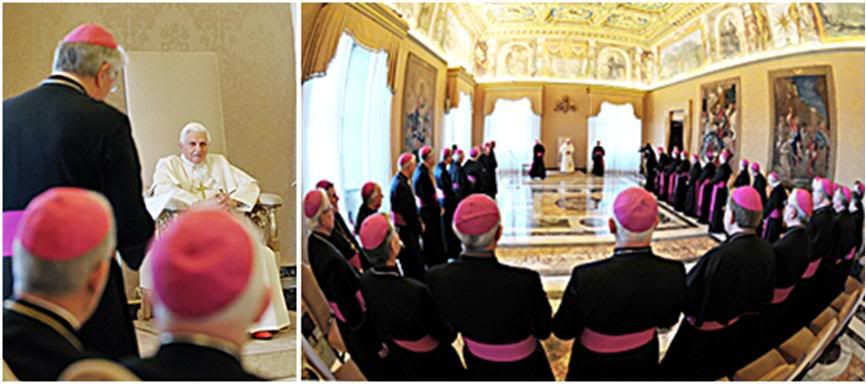
After receiving them in separate groups last week and this morning, the Holy Father met with all bishops of England and Wales who are making their ad limina visit to Rome at the Consistory Hall of the Apostolic Palace at noon today. This was his address to them, delivered in English:
Dear Brother Bishops,
I welcome all of you on your ad Limina visit to Rome, where you have come to venerate the tombs of the Apostles Peter and Paul.
I thank you for the kind words that Archbishop Vincent Nichols has addressed to me on your behalf, and I offer you my warmest good wishes and prayers for yourselves and all the faithful of England and Wales entrusted to your pastoral care.
Your visit to Rome strengthens the bonds of communion between the Catholic community in your country and the Apostolic See, a communion that sustained your people’s faith for centuries, and today provides fresh energies for renewal and evangelization.
Even amid the pressures of a secular age, there are many signs of living faith and devotion among the Catholics of England and Wales. I am thinking, for example, of the enthusiasm generated by the visit of the relics of Saint Thérèse, the interest aroused by the prospect of Cardinal Newman’s beatification, and the eagerness of young people to take part in pilgrimages and World Youth Days.
On the occasion of my forthcoming Apostolic Visit to Great Britain, I shall be able to witness that faith for myself and, as Successor of Peter, to strengthen and confirm it.
During the months of preparation that lie ahead, be sure to encourage the Catholics of England and Wales in their devotion, and assure them that the Pope constantly remembers them in his prayers and holds them in his heart.
Your country is well known for its firm commitment to equality of opportunity for all members of society. Yet as you have rightly pointed out, the effect of some of the legislation designed to achieve this goal has been to impose unjust limitations on the freedom of religious communities to act in accordance with their beliefs.
In some respects it actually violates the natural law upon which the equality of all human beings is grounded and by which it is guaranteed. I urge you as Pastors to ensure that the Church’s moral teaching be always presented in its entirety and convincingly defended.
Fidelity to the Gospel in no way restricts the freedom of others – on the contrary, it serves their freedom by offering them the truth.
Continue to insist upon your right to participate in national debate through respectful dialogue with other elements in society. In doing so, you are not only maintaining long-standing British traditions of freedom of expression and honest exchange of opinion, but you are actually giving voice to the convictions of many people who lack the means to express them: when so many of the population claim to be Christian, how could anyone dispute the Gospel’s right to be heard?
If the full saving message of Christ is to be presented effectively and convincingly to the world, the Catholic community in your country needs to speak with a united voice.
This requires not only you, the Bishops, but also priests, teachers, catechists, writers – in short all who are engaged in the task of communicating the Gospel – to be attentive to the promptings of the Spirit, who guides the whole Church into the truth, gathers her into unity and inspires her with missionary zeal.
Make it your concern, then, to draw on the considerable gifts of the lay faithful in England and Wales and see that they are equipped to hand on the faith to new generations comprehensively, accurately, and with a keen awareness that in so doing they are playing their part in the Church’s mission.
In a social milieu that encourages the expression of a variety of opinions on every question that arises, it is important to recognize dissent for what it is, and not to mistake it for a mature contribution to a balanced and wide-ranging debate.
It is the truth revealed through Scripture and Tradition and articulated by the Church’s Magisterium that sets us free. Cardinal Newman realized this, and he left us an outstanding example of faithfulness to revealed truth by following that "kindly light" wherever it led him, even at considerable personal cost.
Great writers and communicators of his stature and integrity are needed in the Church today, and it is my hope that devotion to him will inspire many to follow in his footsteps.
Much attention has rightly been given to Newman’s scholarship and to his extensive writings, but it is important to remember that he saw himself first and foremost as a priest. In this Annus Sacerdotalis, I urge you to hold up to your priests his example of dedication to prayer, pastoral sensitivity towards the needs of his flock, and passion for preaching the Gospel.
You yourselves should set a similar example. Be close to your priests, and rekindle their sense of the enormous privilege and joy of standing among the people of God as alter Christus.
In Newman’s words, "Christ’s priests have no priesthood but His … what they do, He does; when they baptize, He is baptizing; when they bless, He is blessing" (Parochial and Plain Sermons, VI 242).
Indeed, since the priest plays an irreplaceable role in the life of the Church, spare no effort in encouraging priestly vocations and emphasizing to the faithful the true meaning and necessity of the priesthood.
Encourage the lay faithful to express their appreciation of the priests who serve them, and to recognize the difficulties they sometimes face on account of their declining numbers and increasing pressures. The support and understanding of the faithful is particularly necessary when parishes have to be merged or Mass times adjusted.
Help them to avoid any temptation to view the clergy as mere functionaries but rather to rejoice in the gift of priestly ministry, a gift that can never be taken for granted.
Ecumenical and inter-religious dialogue assume great importance in England and Wales, given the varied demographic profile of the population.
As well as encouraging you in your important work in these areas, I would ask you to be generous in implementing the provisions of the Apostolic Constitution Anglicanorum Coetibus, so as to assist those groups of Anglicans who wish to enter into full communion with the Catholic Church.
I am convinced that, if given a warm and open-hearted welcome, such groups will be a blessing for the entire Church.
With these thoughts, I commend your apostolic ministry to the intercession of Saint David, Saint George and all the saints and martyrs of England and Wales. May Our Lady of Walsingham guide and protect you always.
To all of you, and to the priests, religious and lay faithful of your country, I cordially impart my Apostolic Blessing as a pledge of peace and joy in the Lord Jesus Christ.
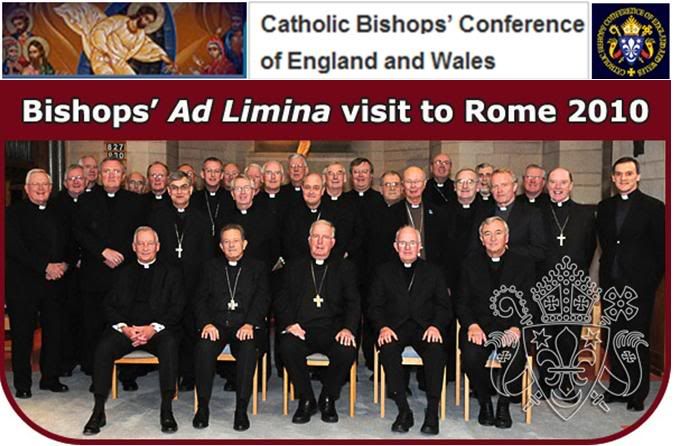 As I have had occasion to comment before, the addresses that the Holy Father gives to the bishops visiting him from various parts of the globe are always a good snapshot of the status of the Catholic Church in each of their respective countries at the time they are delivered, and the main pastoral challenges they face. [To a lesser extent, this is true of his addresses or messages to new ambassadors, which are necessarily more general.]
As I have had occasion to comment before, the addresses that the Holy Father gives to the bishops visiting him from various parts of the globe are always a good snapshot of the status of the Catholic Church in each of their respective countries at the time they are delivered, and the main pastoral challenges they face. [To a lesser extent, this is true of his addresses or messages to new ambassadors, which are necessarily more general.]
The time this Pope gives to visiting bishops is prodigious - he has taken to dividing them up in small groups so he has more time to listen to their reports and interact with them.
P.S. The site of the Bishops' Conference of England and Wales has published the text of Archbishop Nichols's greeting to the Pope before the Holy Father's address:
ARCHBISHOP NICHOLS'S GREETING
TO THE HOLY FATHER
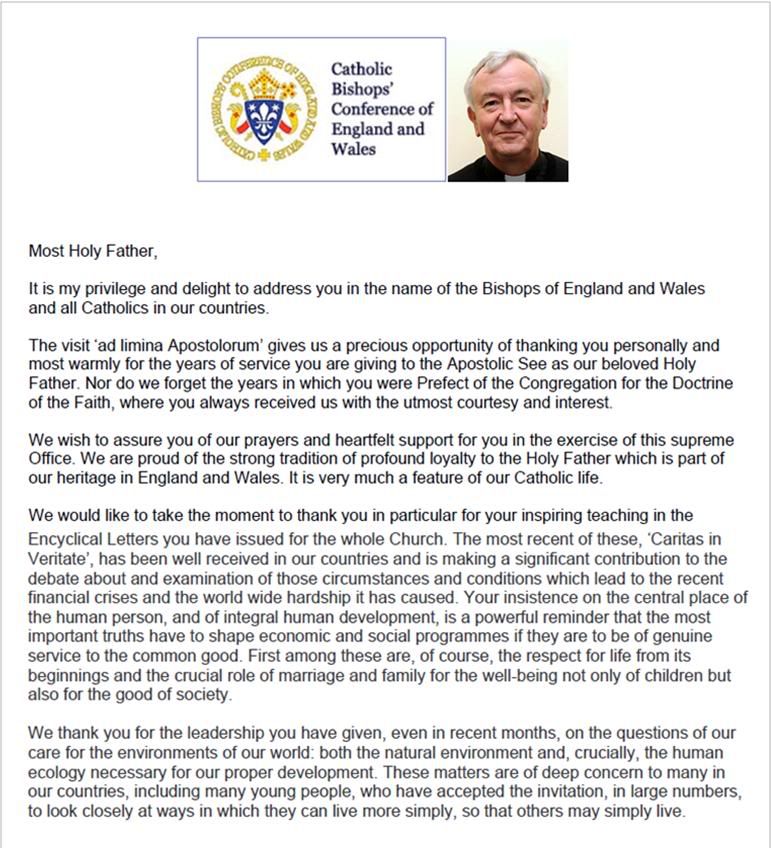
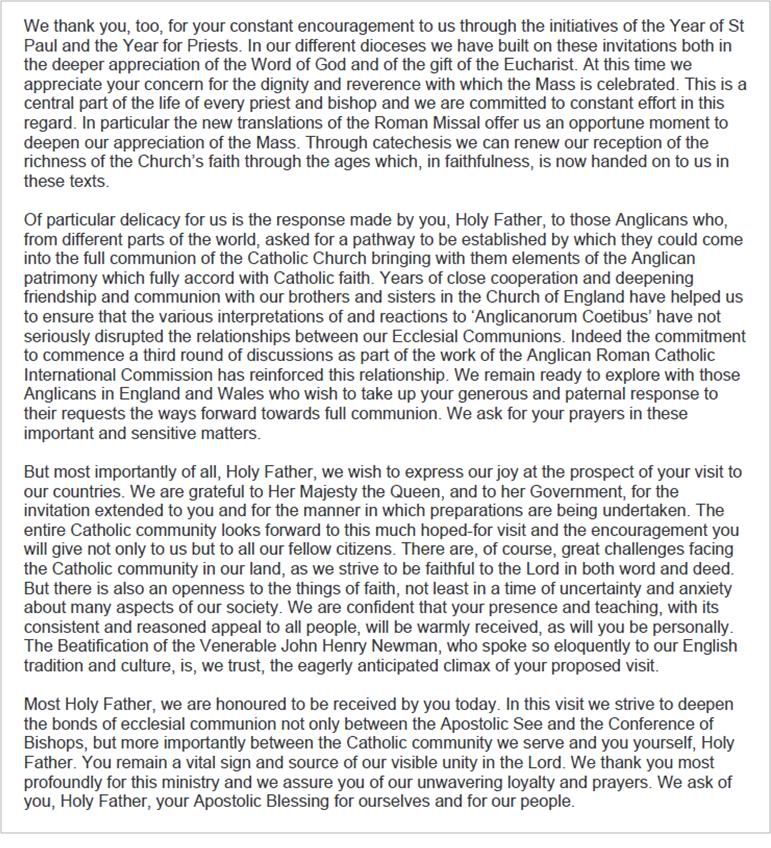 Pope tells English and Welsh bishops
Pope tells English and Welsh bishops
to get their act together

February 1, 2010
The text of Pope Benedict XVI’s address to the English and Welsh bishops at the end of their ad limina visit to Rome has just been released. Much of it is friendly and encouraging – but there is very little in the way of praise and it is full of coded warnings. Such as this:
If the full saving message of Christ is to be presented effectively and convincingly to the world, the Catholic community in your country needs to speak with a united voice.
That is clearly a reference to the fact that, on issues such as gay adoption, the bishops have not been speaking with one voice, so disunited did their conference become under Cardinal Cormac Murphy-O’Connor.
In many passages, I think the Pope has been influenced by Bishop Patrick O’Donoghue, formerly of Lancaster, who has attacked his fellow bishops for failing to uphold orthodoxy – and whom the Pope admires.
Clearly, the Holy Father is disgusted by the anti-religious impulses of the British Government, particularly as enshrined in Harriet Harman’s Equality Bill. He wants the bishops to challenge them forcefully. Whether he thinks they are doing enough is not clear.
To me, it seems as if he is urging them to do much more. Ad limina addresses tend to contain these exhortations, of course – but this one is notably short on congratulation.
Then there is this:
In a social milieu that encourages the expression of a variety of opinions on every question that arises, it is important to recognise dissent for what it is, and not to mistake it for a mature contribution to a balanced and wide-ranging debate. It is the truth revealed through Scripture and Tradition and articulated by the Church’s Magisterium that sets us free.
Well! That should go without saying – so why did the Pope feel the need to say it to the Bishops of England and Wales? Was he perhaps referring to the bishops’ continuing indulgence of the Tablet, a magazine that routinely trashes papal and Vatican initiatives and has in the not so distant past carried articles advocating lay presidency at the Eucharist?
(And, before you write this off as a piece of point-scoring, let me assure you that [S}the former Cardinal Ratzinger was a strong critic of the Tablet and made no secret of the fact. He felt it summed up what was wrong with the Engish Church.)
And there’s this:
Ecumenical and inter-religious dialogue assume great importance in England and Wales, given the varied demographic profile of the population.
As well as encouraging you in your important work in these areas, I would ask you to be generous in implementing the provisions of the Apostolic Constitution Anglicanorum Coetibus, so as to assist those groups of Anglicans who wish to enter into full communion with the Catholic Church.
I am convinced that, if given a warm and open-hearted welcome, such groups will be a blessing for the entire Church.
Again, the Pope should not need to tell the bishops publicly to be generous in this respect; it rather reads as if he suspects that they might not be as welcoming as they should be. If so, his instincts are right.
Some bishops welcome Anglicanorum coetibus, others do not want to see it implemented at all, and the presence of an obstructive old-style ecumenist such as Mgr Andrew Faley on the steering committee for the Ordinariate bodes ill. Hence this papal shot across the bows.
To reiterate: despite many friendly passages, this is not the message that the Bishops of England and Wales were hoping for. But the implied reproaches are directed, I think, at the ancien regime that Archbishop Vincent Nichols has been appointed to bring to an end.
Judging by his latest words, the Pope will expect considerable progress to have been made before he visits us in the autumn.
[Modificato da TERESA BENEDETTA 02/02/2010 15:33] |
| |
 01/02/2010 18:10 01/02/2010 18:10 |
|
| | | OFFLINE | Post: 215
Post: 12 | Registrato il: 28/05/2007
Registrato il: 19/02/2009 | Utente Comunità | Utente Junior | |
|
Teresa. If you have some time in between (or, possibly one of your clones), you might be able to appreciate the latest piece by Paul Badde:
www.kath.net/detail.php?id=25447
Very nice.
 Thanks a lot, Heike. I've read it now, and will post a translation ASAP. I wish Badde would write more often. Also, have you seen anything lately from Peter Seewald?
Thanks a lot, Heike. I've read it now, and will post a translation ASAP. I wish Badde would write more often. Also, have you seen anything lately from Peter Seewald?
TERESA
P.S. As you can see from the post, I went to DIE WELT since Kathnet used the article as is except for the title. But I liked Kathnet's title better than Die Welt's 'Benedict XVI: Radical, modern and Buddha-like', as I am uncomfortable with the description Buddha-like for B16, even though I think Badde means Buddha-like in the sense of being so calm and equable.
[Modificato da TERESA BENEDETTA 02/02/2010 02:12] |
| |
 02/02/2010 02:07 02/02/2010 02:07 |
|
| | | OFFLINE | | Post: 19.393
Post: 2.035 | Registrato il: 28/08/2005
Registrato il: 20/01/2009 | Administratore | Utente Veteran | |
|

 The Pope is Peter:
The Pope is Peter:
A Rock in this world
The Pope would gladly be reproached for being from 'day before yesterday'.
Because he is from many yesterdays before: He embodies a 2000-year Tradition
and for this, he is in the crossfire today.
Yet he is not only radical and modern but also a rock in the current sea of shortlived trends.
by Paul Badde
Translated from

February 1, 2010
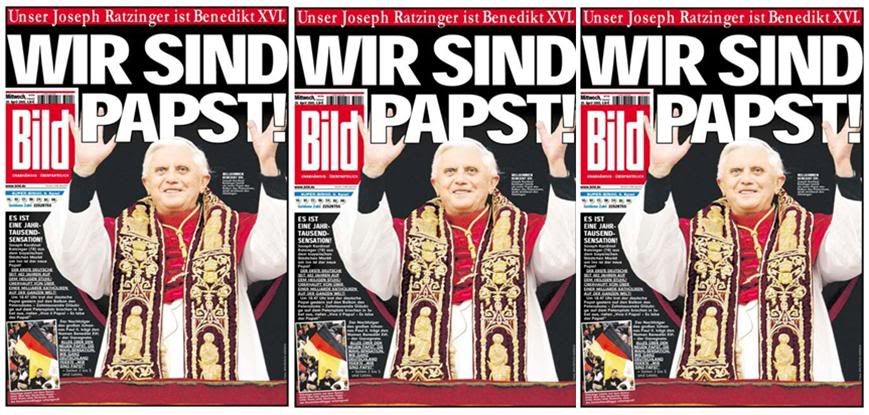 The headline of BILD that proclaimed "WE ARE POPE! - Our Joseph Ratzinger is Benedict XVI'
The headline of BILD that proclaimed "WE ARE POPE! - Our Joseph Ratzinger is Benedict XVI'
ROME - We are not Pope, nor is, thank God!, either the author of this lines nor Klaus Wowereit nor Dietrich Bohlen, and that is as it should be.
Never was Angela Mekerel nor Margot Kaessman Pope, much less all of us Germans together. The 'cliche' that meant the opposite was a clever headline on Page 1 [when Benedict was elected Pope] that was really nonsense with a wink, typical of the Frankfurt school of journalism.
Nor have we been French, for that matter, since Cardinal Joseph Ratzinger was elected to the Academie Francaise in 1992!
Thus, even Alexander Smoltczyk's observation in Der Spiegel that in April 2005, the Germans lost 'their belief in Godlessness' never meant anything either.
This feeling was only due to the overpowering experience of that day on St. Peter's Square, when even completely unmusical people heard something of an angel's choir in the death agony of John Paul II.
Others were overcome by the illusory assumption that with the election of Benedict XVI, the Second World War finally had come to an end for the German people.
All such euphoria is now gone. Now the Godless are back proclaiming themselves, more dogged than ever before in my lifetime, and as aggressive as they need to be to win back lost ground.
It is obvious that Benedict XVI is in the crosshairs of their barrage. Not that he cares. He does not defend himself. He does not go on the talk shows. In fact, there is nothing that stands in the way of the rage from the determined and infuriated ranks of yesterday's social engineers.
Not a few of them have meanwhile become word police or the men in control of the new civil religion which worships everything - except God - that could serve man's self-authority over life, death and destiny.
Among them are the good old masters of Agitprop who have now come to the last bastion that has so far resisted them: the Church and the Pope.
What's disconcerting for Roman observers, however, is how easily all the many brave heros in Germany have ducked away from countering the defamatory and demagogic accusations against the Church and the Pope.
For instance, even the German Bishops' Conference appears to be in terrified paralysis, and allows their own news agency - instead of saying the truth courageously - to feed yet again to every newsroom ebtween Aachen and Passau the sensation-mongering 'news' over something that a great uncle of Joseph Ratzinger had said in the 19th century about the Jews - a kind of retrograde generational bad press for the Pope! [So they're holding him responsible for any opinion any in his family might ever have held? Hard to believe such an attitude could be held by any right-thinking person, but apparently there are those in the DBK who do - a pox on all their houses!] Yet not a word of outrage about that from Berlin.
In Italy, on the other hand, almost every word of importance that the Pope says gives rise to weighty debates in all the newspapers from left to right.
The Poles, in their identification with their Pope, were able to bring the Soviet system to collapse from the Berlin Wall to Beringstrasse.
And yet the worst reproach against Pope Benedict outside Germany itself, after analyzing all the arguments, is really that he is German (and therefore, 'naturally' a dyed-in-the-wool anti-Semite, etc. etc.).
That the English brought this up as soon as he was elected was self-explanatory. But that this was so hyped up in the land of the Reformation should not be cause for many in Rome or Warsaw or Paris to wonder or to rub their eyes in disbelief. Because, in Germany itself, no one seems willing to stand with the Pope.
He is the most modern Pope there ever was - his erudite brilliance world-enowned, his doctrine of the separation of Church and State radical - a Buddha on Peter's Chair, the Pope who unlike any other has occupied himself with the beliefs of Judaism, and perhaps, the most ecumenical Pope we have ever had (though not for ecumenism at any cost), even if many are already thinking that the next Pope should come from the Third World.
But he is German. And therefore, we must dwell a bit on what he believes.
Catholics do not only believe in one God. They also believe, as a consequence of this conviction, that there is Truth. One Truth - not two, three, four or countless truths. And what is true cannot be untrue at the same time. No amount of repetition will make lies true.
Pious Catholics share this belief in the existence of one Truth with pious Jews and pious Muslims. But because of religious freedom, one is not supposed to share the Catholic Creed with others.
In our part of the world, this truth in the modern era was expressed by the Catholic Alexis de Tocqueville, who was a contemporary of Karl Marx: "I believe I have loved freedom at all times, but in the times in which we live, I feel inclined to worship it".
That is why the Catholic Church's rigorous relationship with Truth seems even more inflexible, in the face of everyone else who believe one thing today and another tomorrow, maintaining that anyway, there is no universally valid truth. That's according to those who flaunt the spirit of the times.
Yesterday they were Communists, tomorrow they will Be Buddhists, day after perhaps moon worshippers. But they are also quite human, all too human. But less human is the Inquisition-like fury with which they attack full throttle at every new bend and curve.
I must admit there are two incompatible worlds in opposition. Whereas believers in Truth (even when part of the Truth is still hidden to them) depend on it as a deeply anchored guidepost, genuine atheists lack any such calming support. They can only rely on themselves since they find nothing else reliable. They would like to be on the right side this time, for once. And that is what they are striving for, which is rather dangerous.
It is exactly what Cardinal Joseph Ratzinger, on the eve of being elected Pope, warned against when he denounced the threatening 'dictatorxhip of relativism'. Because those who would level out the difference between truth and lies will also level out other differences.
And why not? When one can say anything one pleases? Everything is relative. There is no truth. There exists only what one accepts.
What has the Pope been accused of? That he did not say and do enough in Auschwitz or in Jerusalem? What is 'enough'? Is he supposed to yield and allow himself to be used as the funereal celebrant of a rite centered on the totalitarian apocalypse?
The truth is that it was not the Catholic Church that committed a criminal breach of civilization in the 20th century nor was it responsible for it. Those responsible were the new pagans a la mode in the 20th century.
And yet these clanging cymbals are now stirring up hatred for the Pope that smells exactly like the hate the Nazis harbored against Pius XII.
Because Benedict XVI deranges them. And so they rail against him as if he were the Taliban. That's the way it is.
Yesterday I read that the Pope from Bavaria is not just German, but a German 'from the day before yesterday', and this is where it becomes rather ridiculous.
And yet, he is not a man from day before yesterday. He is a man from many yesterdays before. He is 2000 years old. He is Peter, a Galilean from Bethsaida by the lake. And that is why he is reconciling the Church so radically with its authentic apostolic Tradition - uninterrupted despite a checkered history - and back to Jesus of Nazareth himself who said "I am the Way, the Truth and the Life".
Those who do not get that do not understand anything about the Catholic Church. Benedict XVI has devoted himself utterly to the Truth of the merciful God, for whom he too will give his life as his predecessors did.
He is a man from long before yesterday and for long beyond tomorrow. How many empires have crumbled in the past 2000 years? The Pope remains.
In this world, Peter is the rock.
[Modificato da TERESA BENEDETTA 02/02/2010 03:41] |
| |
 02/02/2010 04:40 02/02/2010 04:40 |
|
| | | OFFLINE | | Post: 19.394
Post: 2.036 | Registrato il: 28/08/2005
Registrato il: 20/01/2009 | Administratore | Utente Veteran | |
|

 It's at least two months and a half too early to mark five years of the Benedictine Pontificate, but here's yet another tribute - a different type - from an American blogger.
If you were going to build
It's at least two months and a half too early to mark five years of the Benedictine Pontificate, but here's yet another tribute - a different type - from an American blogger.
If you were going to build
an image of the ideal Pope
from scratch, he might look like this
by Frank Webster

January 21, 2010
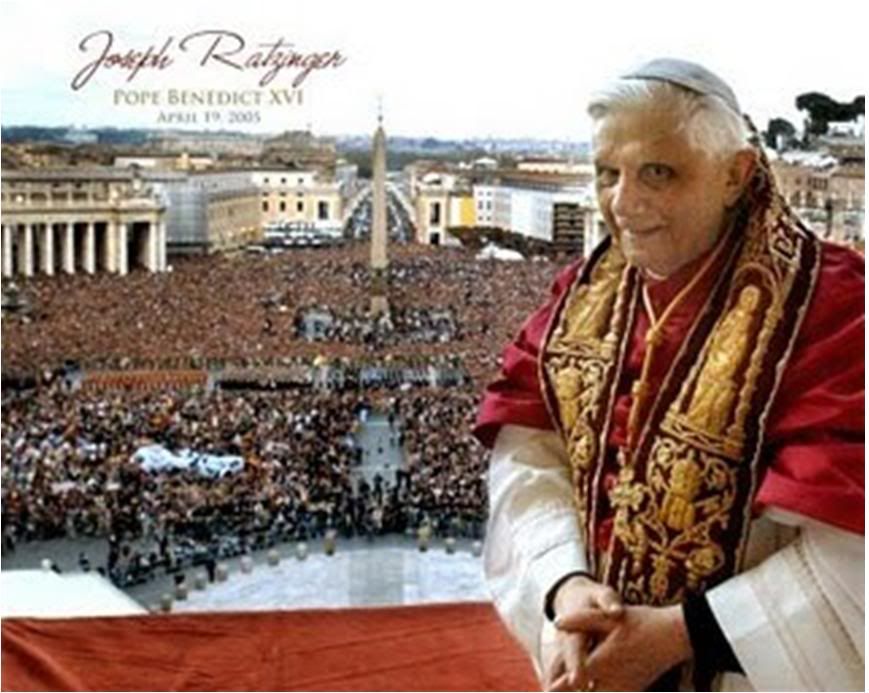
In Orthodoxy, GK Chesterton uses a striking strategy to back the Christian claim. He defines, piece by piece, the components of a sound philosophy, then demonstrates that Christianity is built of exactly these components. I would argue that, using the same method, you could build Pope Benedict from scratch.
If you set out to build an ideal leader for the Universal Catholic Church at the beginning of the 21st century, what characteristics would you look for?
You would look for humble origins. The first words of Joseph Ratzinger’s memoir, Milestones 1927–1977, are: “It is not at all easy to say what my hometown really is. As a rural policeman, my father was transferred frequently, so we were continually on the road. In 1937, however, when my father turned sixty and retired, we moved into the house in Hufschlag, outside Traunstein, and for the first time we had a real home.” That was the year our Pope turned ten.
In Salt of the Earth, the first of two books of interviews with Ratzinger conducted by journalist Peter Seewald, our Pope explains further: “We were not poor in the strict sense of the word, because [my father’s] monthly salary was guaranteed, but we did have to live very frugally and simply, for which I am very grateful.”
You would look for someone whose family was devout — In Salt of the Earth, Seewald asks him if his family home was “markedly religious.” Ratzinger answers: “One could certainly say that. My father was a very religious man. On Sundays he went to Mass at six, then to the main liturgy at nine, and again in the afternoon. My mother had a very warm and heartfelt piety. . . . Religion was quite central.”
In the second book of Seewald interviews, God and the World, the journalist asks him, “Do you have a particular way of praying the Rosary?”
I love his answer: “I do it quite simply, just as my parents used to pray. Both of them loved the Rosary. And the older they got, the more they loved it.”
The Ratzingers had three children. Joseph’s older brother, Georg, became a priest as well, ordained on the same day as Joseph. Their sister, Maria, never married and, in her adult life, took care of the future Pope’s household when he was a bishop and then a cardinal.
You would look for someone who witnessed the greatest evil humanity has to offer — Namely, the Third Reich. Ratzinger’s father set a highly principled example, beginning in 1933, when Hitler became chancellor:
“It mortified my father to have to work [as a village constable in Bavaria] for a government whose representatives he considered to be criminals, even if local policemen in the village were for the time being, thanks be to God, hardly affected by the changes.
"As far as I can see, the sole result of the new regime, during the four years we spent here, was the practice of spying and informing on priests who behaved as ‘enemies of the Reich.’ It goes without saying that my father had no part in this. On the contrary, he would warn and aid priests he knew were in danger.” (Milestones)
A family member recently asked me, “But wasn’t the Pope in the Hitler Youth?” The answer is, yes, but:
“When the compulsory Hitler Youth was introduced in 1941, my brother was obliged to join. I was still too young, but later, as a seminarian, I was registered in the HY. As soon as I was out of the seminary, I never went back.
And that was difficult, because the tuition reduction, which I really needed, was tied to proof of attendance at the HY. Thank goodness, there was a very understanding mathematics teacher. He himself was a Nazi but an honest man, who said to me, ‘Just go once and get the document so that we have it . . . ’ When he saw that I simply didn’t want to, he said, ‘I understand, I’ll take care of it,’ and so I was able to stay free of it.” (Salt of the Earth)
But didn’t Ratzinger serve in the German army? Again, the answer is yes, but: “From 1943 on, the seminarians in Traunstein were all conscripted into antiaircraft work at Munich. I was sixteen years old, and for a whole year, from August ’43 to September ’44, we did our service.” (Salt of the Earth)
This work, as a range-finder to help his native Bavaria protect itself against Allied bombers, was followed by noncombatant service in the infantry and time in an American POW camp when his native Traunstein was overrun by the Allies.
You would look for someone who witnessed the greatest Catholic event of our times, Vatican II, and participated actively in its deliberations. As theological advisor to a key cardinal at the Second Vatican Council, Ratzinger had a significant role.
I have neither the knowledge to discuss nor the time to research this question. Here it’s enough to note that Seewald asks him at one point: “One can probably say that without your involvement the reforms of the Second Vatican Council would have been unthinkable.”
Ratzinger answers this stunning question with suitable humility: “I feel that you are quite over-estimating my role. If there had not also been a large group of like-minded people, no individual, not to mention a theologian who was totally unknown around the world, could have had any importance.” (Salt of the Earth)
You would look for a brilliant theologian. Ratzinger is the first professional theologian to become Pope in several hundred years, and what better time, when so many complex issues remain to be sorted out, even 45 years after the close of Vatican II?
In the 1960s and 1970s, Ratzinger became a respected colleague of leading theologians like Hans Urs von Balthasar, Karl Rahner, and (more contentiously) Hans Küng. And he was a central player in the creation of the leading journal of Catholic theology to come out of that era, Communio, which is still in operation, although its co-founder recognizes its limitations:
“It has for a long time remained too academic, and we have not succeeded in intervening in the contemporary debate in a sufficiently concrete and timely manner. Nevertheless, the publication performs an important service, and the years of collaboration with the community of editors widened my horizons and taught me many things.” (Milestones)
You would look for someone who humbled himself through obedience. In 1977, Ratzinger was appointed Cardinal of Munich and Freising in his native Bavaria, and by all accounts he relished the thought of developing his theology in familiar surroundings for the rest of his working life.
At a Synod, also in 1977, he began to develop a working friendship with Polish cardinal Karol Wojtyla. The following year, Wojtyla became Pope John Paul II, and in 1981, after declining the offer previously, Ratzinger reluctantly agreed to move to Rome to become Prefect of the Congregation for the Doctrine of the Faith, once known as the Holy Inquisition.
He knew what this would mean: Perhaps never returning to Bavaria, perhaps never having the leisure to pursue his theological studies and writings, and doubtless becoming very unpopular. As he left Munich for Rome, he famously said to friends, “Not all news that comes from Rome will be pleasant.”
He knew that as the Cardinal entrusted by the Pope with maintaining doctrinal purity among bishops, he would make plenty of enemies. By the time he became Pope himself in 2005, the shy theologian from Bavaria had been nicknamed the Panzerkardinal.
I like his answer when Seewald asks him if being German was an advantage or a disadvantage in his position of curial power. It is a remarkably kind and balanced answer:
“We all know what Germans are supposed to be like. In that respect it’s easy to attribute decisions that incur displeasure to German stubbornness. Fanatical attachment to principles, lack of flexibility, all of that is also seen as an expression of the German spirit.
"When the term Panzerkardinal was coined, it certainly involved this sort of allusion to the fact that I am German. On the other hand, no one has ever, at least to my face, treated my Germanness with hostility or overemphasized its importance.
"In fact, it has become known everywhere that I don’t engage privately in politics but that I am part of a whole, so that what I do is not simply the expression of my private character as a German but comes out of the entire structure of curial ministries and offices.” (Salt of the Earth)
You would look for someone who did not want the Papacy. Seewald, whose interviews with Ratzinger spanned the decade of the 1990s, began his work as a lapsed Catholic and a communist, highly skeptical, perhaps even cynical about anything Ratzinger might say.
His first question published in the first book, Salt of the Earth, is typical, a carefully prepared trap: “Your Eminence, it is said that the Pope is afraid of you. He asks himself: For heaven’s sake, what would Cardinal Ratzinger say about that?”
Ratzinger laughed off the question: “He might say that jokingly, but he is definitely not afraid of me!”
By 2005, Seewald had returned to the Church, although he had to get over the suspicion that some would see this as “a cheap marketing stunt for the book, under the caption, ‘Cardinal Converts Communist to Catholic Church.’ So I did it silently — and secretly rejoiced.”
In his third book about the Ratzinger/Benedict, Benedict XVI, An Intimate Portrait, published after the conclave of 2005, Seewald proved to my satisfaction that Ratzinger wanted nothing so much as to avoid election himself, retire from the Congregation, and return to Bavaria to live his last years in peace.
At midday on April 19, the day he would be elected, Ratzinger was “unsettled,” according to Seewald. He had emerged as the leading candidate in previous ballots, and was not comfortable with this fact.
“As the course of the voting gradually led me to perceive that the guillotine was going to fall on me, so to speak,” he toldan audience of Germans after the fact, “I felt quite dizzy. I had believed I had completed my life’s work. [Then I] said to the Lord with keep conviction, 'Don’t do this to me! You have younger and better men, who can approach this great task with very different élan and very different strength'. As we know, the Lord had other ideas."
I think that if you look closely at the photograph at the top of this post, taken as the newly elected Pope turned away from the cheering crowd, you can see in his eyes a combination of happiness, sadness, and overwhelming fatigue. [Sadness? Fatigue? The first word that comes to my mind is 'wistful', wistful and happy, and I certainly do not see 'overwhelming fatigue.]
The Spirit has carried Pope Benedict XVI forward for nearly five years now. Good health and long life to our Pope!
[Modificato da TERESA BENEDETTA 02/02/2011 12:32] |
| |
 02/02/2010 13:13 02/02/2010 13:13 |
|
| | | OFFLINE | | Post: 19.396
Post: 2.038 | Registrato il: 28/08/2005
Registrato il: 20/01/2009 | Administratore | Utente Veteran | |
|
 Tuesday, February 2
Tuesday, February 2
 From left: The Presentation portrayed by Giotto (1304), a 14th-century Russian icon, Bellini (1459), Cosma Ture (1474) and Raphael (cropped)(1503).
FEAST OF THE PRESENTATION OF JESUS IN THE TEMPLE
From left: The Presentation portrayed by Giotto (1304), a 14th-century Russian icon, Bellini (1459), Cosma Ture (1474) and Raphael (cropped)(1503).
FEAST OF THE PRESENTATION OF JESUS IN THE TEMPLE
The event is described in the Gospel of Luke 2:22–40: Mary and Joseph took the baby Jesus to the Temple in Jerusalem forty days after his birth to complete Mary's ritual
purification after childbirth, and to perform the redemption of the firstborn, in obedience to the Law of Moses. Upon bringing Jesus into the temple, they encountered Simeon
the Righteous, who had been promised that "he should not see death before he had seen the Messiah of the Lord." Simeon prayed the prayer that would become known as the
Nunc Dimittis, or Canticle of Simeon, which prophesied the redemption of the world by Jesus: "Lord... I have seen with my own eyes the one you have sent to save people.
You have made this way for all peoples to be saved..." Simeon then prophesied to Mary: "He will be a sign that people do not believe in. He will make many people in Israel fall
and rise. (Yes, a long knife will cut your heart too.)..." The elderly prophetess Anna was also in the Temple, and offered prayers and praise to God for Jesus, and spoke
to everyone there about Jesus and his role in the redemption of Israel.
Celebrated 40 days after Christmas, this is one of the 12 major feasts of the Orthodox Church. In the English-speaking world, it is also known as Candlemas, from a
tradition started by Pope Sergius in the 16th century based on a candlelight procession held by the early Christians of Jerusalem to celebrate the event.
Readings for today's Mass: www.usccb.org/nab/readings/020210.shtml
OR for 2/1-2/2/10:
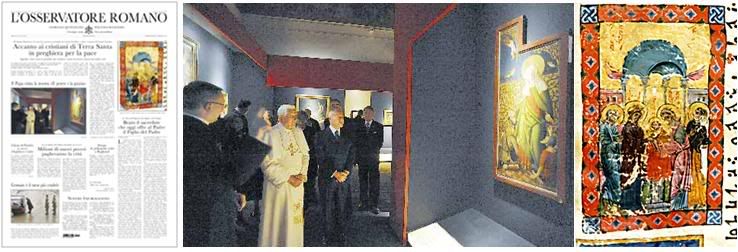 Illustration: The Presentation in the Temple, 12th century Syriac miniature.
Illustration: The Presentation in the Temple, 12th century Syriac miniature.
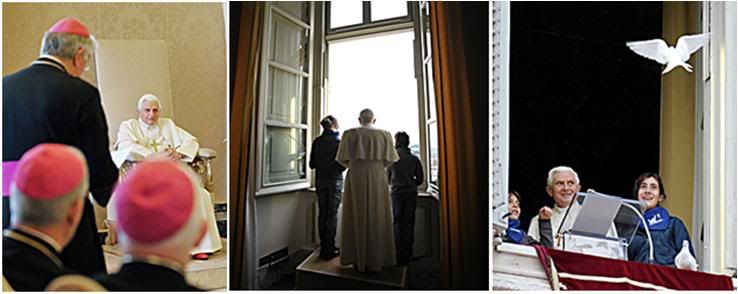
At the Sunday Angelus, Benedict XVI prays for lepers
and greets Rome's Catholic Action youth on their annual Caravan for Peace:
Joins Christians in the Holy Land to pray for peace
Appeals to Italian authorities to do everything to protect workers facing unemployment due to the economic crisis
Other papal stories: The Holy Father's surprise visit to a major exhibition of Christian art, and his message to the visiting bishops
of England and Wales. The major international news is about the woman suicide bomber who kills 41 pilgrims and wounds more than
a hundred Shiites on their way to the city of Kerbala for an annual religious feast. The inside pages contains three stories on Pius XII -
one denouncing the false 'news' about new documents discovered against Pius XII [see stories in the CHURCH&VATICAN thread);
a reprint of an account written in 1994 by Cardinal Paolo Dezza of a 1942 conversation with Pius XII about the Nazi problem; and a
translation of Dimitri Cavalli's essay in defense of Pius XII which appeared in the Israeli newspaper Haaretz last week [posted on this
thread on 1/22]. Also, three articles about the consecrated life since the Church honors consecrated persons today.
THE POPE'S DAY
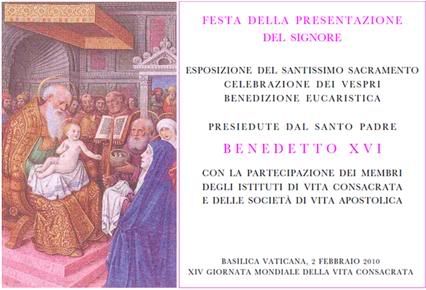 Feast of the Presentation of the Lord and
Feast of the Presentation of the Lord and
the World Day of Consecrated Life
5.30 p.m. St. Peter's Basilica
Vespers with members of institutes of consecrated life
and societies of apostolic life.
[Modificato da TERESA BENEDETTA 02/02/2010 15:34] |
| |
 02/02/2010 14:28 02/02/2010 14:28 |
|
| | | OFFLINE | | Post: 19.397
Post: 2.039 | Registrato il: 28/08/2005
Registrato il: 20/01/2009 | Administratore | Utente Veteran | |
|
 For leading us to this item,
For leading us to this item,
thanks to Lella and her blog
 Pope Benedict XVI prepares
Pope Benedict XVI prepares
to return to Bressanone in the summer
by Ezio Danieli
Translated from
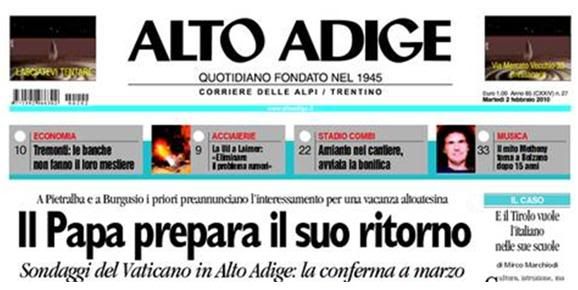
February 2, 2010
BOLZANO - It is very likely Pope Benedict XVI will take his summer vacation this year once more in Bressanone. At the Major Seminary where he stayed in 2008, but this time for almost three weeks.
Three Angelus events are planned: at Piazza Duomo in front of the Bressanone Cathedral, at the Marian shrine of Pietralba, and at the Benedictine monastery of Santa Maria in Burgusio.
The conditional is obligatory since there is no official announcement yet from the Vatican, which is expected by the end of March.
From the last week of July to the first half of August, the Pope is expected to spend his second holiday as Pope in Bressanone/Brixen, where he had spent at least 10 summer vacations before he became Pope.
Fr. Lino Pacchin, the Prior at Pietralba, said: "The news has become rather insistent recently but we must await the official announcement from the Vatican."
He said that the shrine had invited the Pope in 2008, when he was last in Bressanone, to visit Pietralba, a shrine he had often visited before 2005. Pacchin said he thought the Pope chose not to go because he was still resting from his trip to Sydney.
During that vacation, the Pope's only excursion outside Bressanone was a visit to the shrine of St. Josef Freinademetz in Oies.
Mons. Bruno Trauner, abbot of the Benedictine monastery on Monte Maria overlooking Burgusio, was similarly prudent. "Let us await the official decision of the Vatican. Naturally, we are all looking forward to having him back in Alto Adige. And obviously, it would be a great gift to us if the Pope came to our monastery which he knows quite well". Cardinal Ratzinger visited them a couple of times in the past.
He also says that in 2008, the Pope's private secretary, Mons. Georg Gaenswein, and the Pope's chief security officer, Inspector General Domenico Viani, had gone to Burgusio on a reconnaissance visit just in case the Pope would decide to visit during that vacation.
The Shrine of Our Lady of Pietralba, with its attached convent for friars of the Servants of Mary, is very accessible by car, and would not pose any particular logistical problems if the Pope presides at Angelus there. (John Paul II had visited the shrine before.) The Pope would get to Pietralba by helicopter from Bressanone.
I have not yet been able to reactivate all the photos I stored in Photobucket under my previous account, so I may have to rebuild all my Bressanone pictures!
[Modificato da TERESA BENEDETTA 02/02/2010 14:38] |
| |
 02/02/2010 19:23 02/02/2010 19:23 |
|
| | | OFFLINE | | Post: 19.398
Post: 2.040 | Registrato il: 28/08/2005
Registrato il: 20/01/2009 | Administratore | Utente Veteran | |
|

 It is fascinating how Benedict XVI uses his Sunday Angelus messages as a parish priest does with his Sunday homily, except that in his case, he has three parishes to think about - the universal Church, the Church in Italy, and the Church of Rome. Last Sunday, he had multiple message to give on each level... And his appeal in behalf of Italian workers threatened with job loss was properly played up in the Italian media. One headline read: 'Benedict XVI, labor leader'.
It is fascinating how Benedict XVI uses his Sunday Angelus messages as a parish priest does with his Sunday homily, except that in his case, he has three parishes to think about - the universal Church, the Church in Italy, and the Church of Rome. Last Sunday, he had multiple message to give on each level... And his appeal in behalf of Italian workers threatened with job loss was properly played up in the Italian media. One headline read: 'Benedict XVI, labor leader'.
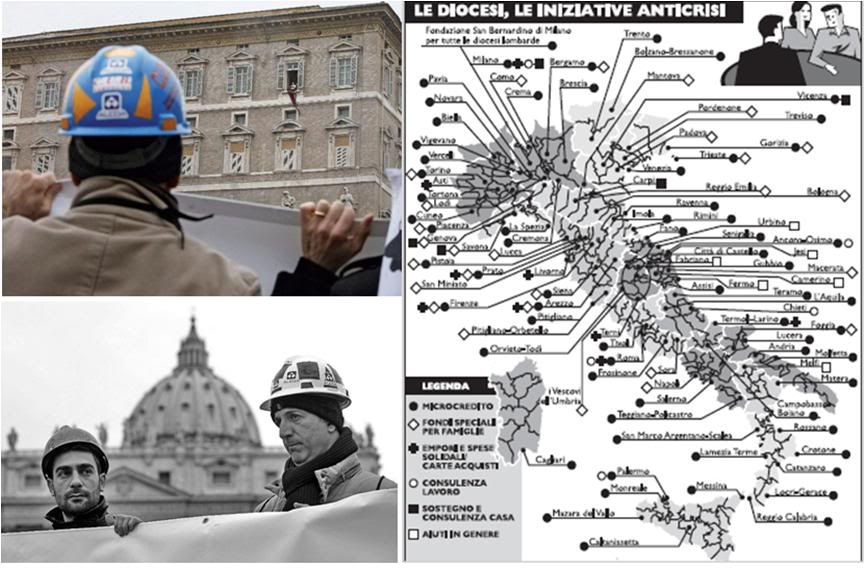 Workers in endangered Italian industries turned up in St. Peter's last Sunday to seek the Pope's moral support. Right photo, courtesy of Avvenire, shows the extent of the industrial dislocation in Italy due to the economic crisis, and the dioceses mobilized to assist those who are affected.
Benedict XVI, Primate of Italy
Workers in endangered Italian industries turned up in St. Peter's last Sunday to seek the Pope's moral support. Right photo, courtesy of Avvenire, shows the extent of the industrial dislocation in Italy due to the economic crisis, and the dioceses mobilized to assist those who are affected.
Benedict XVI, Primate of Italy
and spokesman for labor:
An impassioned Angelus appeal
in behalf of Italian workers
Editorial
by FRANCESCO RICCARDI
Translated from

February 2, 2010
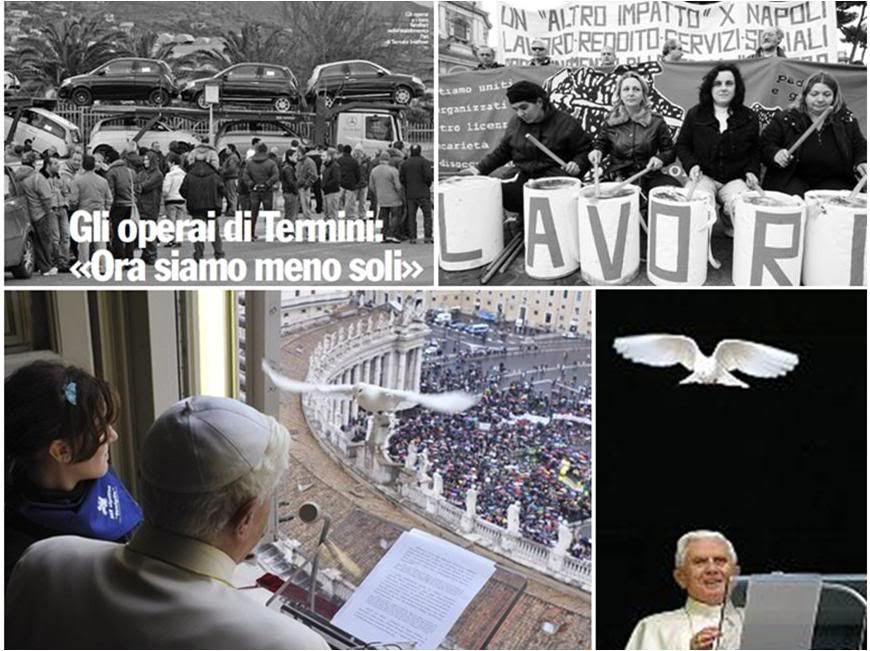 Upper left photo, workers in Termini say "Now we feel less alone!"
Upper left photo, workers in Termini say "Now we feel less alone!"
What was most striking in the Pope's appeal last Sunday to protect workers' jobs was his strong emphasis on the responsibility of two enterprises he identified by the names of the places most affected by their planned retrenchments.
The specification goes beyond its mere news value to be a general emblematic symbol for the crisis in Italy today.
Since the global economic crisis began in late 2008, Benedict XVI has spoken out several times for job protection and creation, calling on entrepreneurs and managers to look beyond mere profit considerations.
Why then did he single out the factories in Termini Imerese and Portovesme (sites, respectively of large Fiat and Alcoa plants), when more than 300,000 jobs were lost in 2009 and a few more thousands in danger of losing theirs?
If the Pope felt the urgency of such a specific appeal, coupled with a similar appeal earlier this week by the Italian bishops' conference (CEI), it is probably because he sees in the industrial disputes afflicting those two localities a fundamental illustration of what he advocated in the encyclical Caritas in veritate: the centrality of man even in the economic process and the social function of business.
It is something that goes far beyond a simple appeal not to close down this plant or that, but involves the sense of why - and therefore how - one does business.
This is not a time for oversimplification, nor for bargaining, such as government incentives for buying cars in return for non-closure of Fiat at Termini Imerese; or further concessions, after already giving discounts for electric costs, in order to keep open Alcoa's aluminum plant in Portovesme.
The problem on hand is, so to speak, meta-economic. In the sense that neither the Pope nor the Church with him can enter into the specifics of economic costs or industrial strategies, which are the competence of industry leaders and local government officials.
Businesses should be able to restructure rather than trust that the crisis can be resolved by simply freezing activity. But precisely because of the social responsibility of entrepreneurs and managers alike, a different interpretation of business in the light of the crisis has become indispensable.
Industry, for instance, can no longer be seen merely as a dispersal of industrial plants wherever land costs less or public incentives are more attractive, and as a simple exchange between capital and labor for as long as the enterprise brings profits.
The enterprise must be seen as a community of men and women rooted to a territory and dedicated to create development and wellbeing for individual members as well as the whole community.
If this is the model of the new capitalism which we should build without ignoring the mechanisms of the market and of free initiative, then the central hinge of action becomes personal and managerial responsibility.
And this starts with the enterprise taking responsibility for the future of those who have worked with it, contributed to its development and its growth and expansion to other places as well.
That is why it seems unacceptable for a multinational giant like Alcoa to leave Sardinia and all the workers dependent on it. That is why it is absolutely necessary to plan new employment and productive prospects for the workers of Termini Imerese - if Fiat truly decides that it can no longer sustain its Sicilian operations on an industrial level.
Perhaps it has decided that it is no longer productive to continue manufacturing the Lancia Ypsilon in Sicily. But could it not think of a diversification or a joint venture, or help finance the birth of a new business through favorable terms using existing personnel and equipment, rather than simply firing its workers?
This would be an exercise of that social responsibility that the Pope specifically referred to. It involves, of course, a definitive change in industrial policy. For instance, is it really for the country's wellbeing and its authentic development to provide incentives for the purchase of cars that are reduced to a bare minimum of features? Cannot the money be better used to finance research and development or production of other goods?
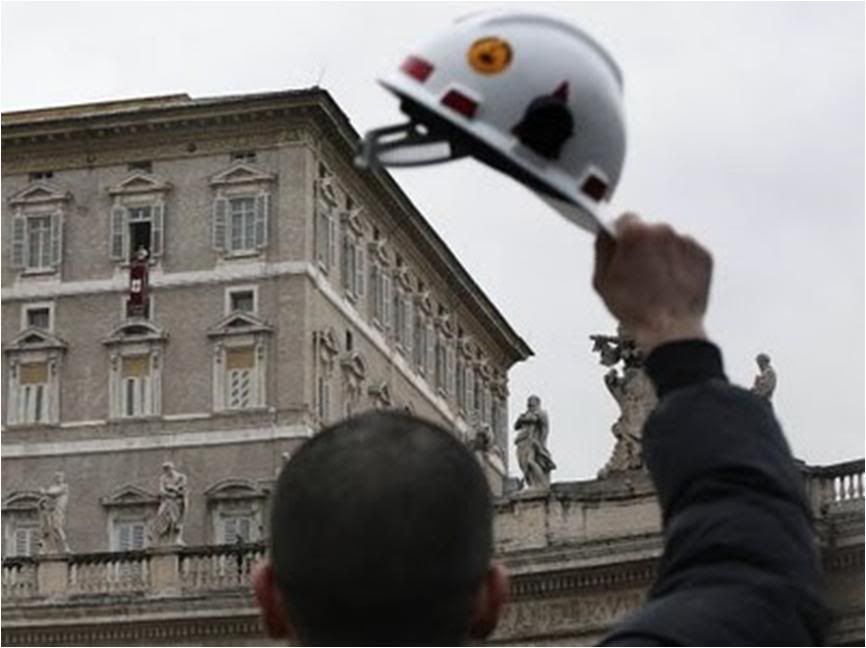 On the other hand, Luigi Accattoli notes that the Pope had intervened just as directly on behalf of workers in specific industries and localities on two occasions last year. I remember the reference in Cassino when he was visiting there, but the earlier multiple references I do not recall - perhaps because they came during his greetings in Italian, and not as a separate special appeal. But Accattoli's point is very well-taken, and reinforces the impression that Benedict XVI takes concrete and not merely abstract interest in the problems of his Church in Italy.
The Pope and his choice
On the other hand, Luigi Accattoli notes that the Pope had intervened just as directly on behalf of workers in specific industries and localities on two occasions last year. I remember the reference in Cassino when he was visiting there, but the earlier multiple references I do not recall - perhaps because they came during his greetings in Italian, and not as a separate special appeal. But Accattoli's point is very well-taken, and reinforces the impression that Benedict XVI takes concrete and not merely abstract interest in the problems of his Church in Italy.
The Pope and his choice
of the direct approach
by Luigi Accattoli
Translated from

February 1, 2010
For the third time in eleven months, Pope Benedict yesterday cited a Fiat industrial site which threatens to close down - that in Termini Imerese (Sicily). On May 24 last year, he spoke of the 'precariousness' of work for Fiat employees in Cassino, and before that, on March 1, he made an appeal for the 'future' or Fiat workers in Pomigliano d'Arco.
It is difficult to say if the papal appeals will help save all those jobs, but it can be said that the direct appeals, naming industrial sites in crisis, come unhesitatingly from a theologian Pope who prefers not to refer to negaive situations in generic statements, whether he is speaking about the Church or about society in general.
On Sunday, he spoke at the same time of Fiat in Termini Imerese and the multinational (mostly US) company Alcoa and its aluminum operations in Sardinia, showing that he does not hesitate to tackle non-Italian corporations as well. In both cases, he implored that everything possible be done to save the jobs.
We may have become so used to all sorts of appeals that often we do not pay attention to the form in which such appeals are made. But the Pope's appeal on Sunday was not without cost: his words applied pressure on both the government and on the two industrial giants.
In March 2009, he named a number of Italian regions hit by the employment crisis: He greeted "the workers of Fiat from Pomigliano d'Arco" who were present in St. Peter's Square, even as he referred to the threatened loss of jobs "in Sulcis-Iglesiente, Sardinia; Prato in Tuscany; and other centers in Italy".
Certainly, it is not the first time that a Pope refers to industries in crisis. John Paul II did it too.
But the added touch of naming the places and industries affected whenever possible is characteristic of Benedict XVI with the same directness and precision that he deplored, in his letter to Catholic bishops in March last year, the opposition he had met in the Church itself after he lifted the excommunication of the FSSPX bishops.
[Modificato da TERESA BENEDETTA 02/02/2010 20:54] |
| |
|
|
|
|